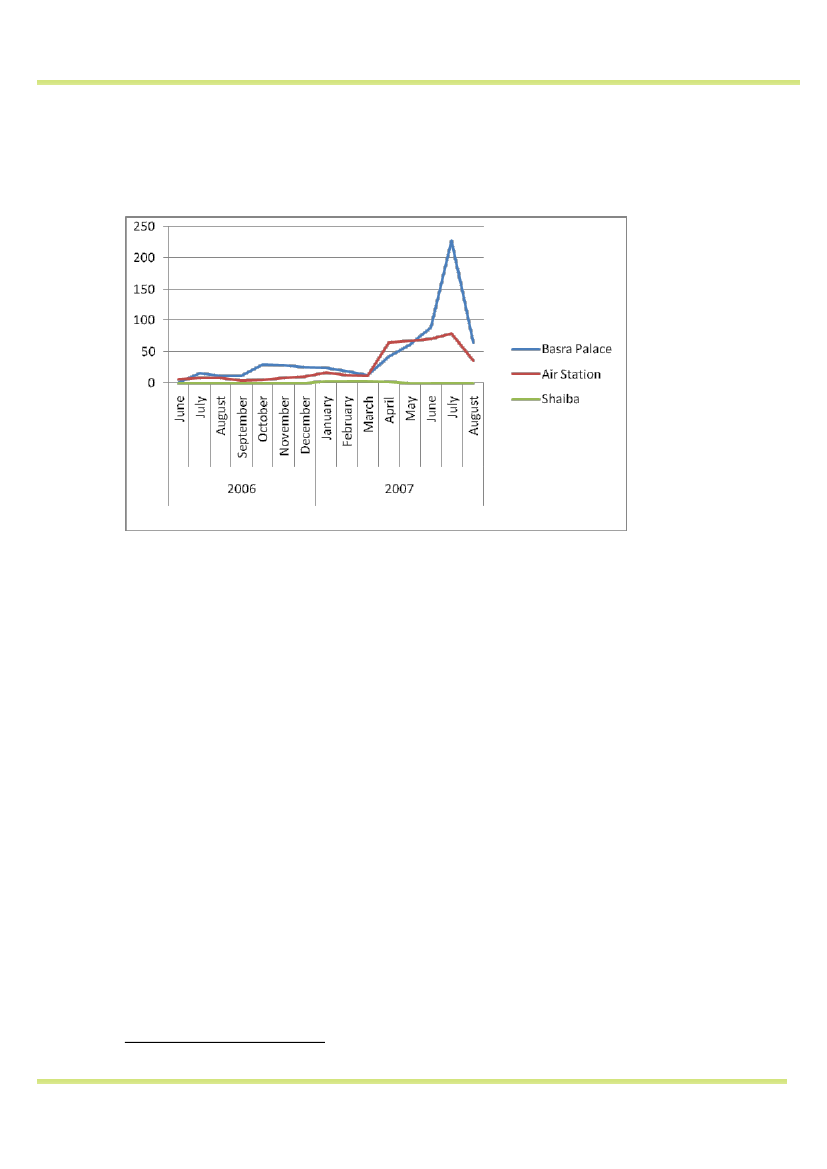Udenrigsudvalget 2010-11 (1. samling)
URU Alm.del
Offentligt
8thApril 2008
For The Ministry of Foreign Affairs of Denmark
Focus-paper - FinalAchievements in the Iraqi-Danish Partnership forReconstructionBased on a Desk Review of Documents and Workshop Discussions
104.Irak.2-21
By Kimiko Hibri Pedersen, COWI A/S and FinnSkadkær Pedersen.
Focus-paper
i
Table of ContentAbbreviationsExecutive Summary123Background and IntroductionObjectives of the PartnershipWorking in Fragile States12691111121414
3.1 Definitions3.2 Development Assistance to Fragile States3.3 Civilian-Military Co-planning3.4 Guiding principles for Provincial Reconstruction Team
45
Methodological issuesThe Context in which the Partnership took place
151717
5.1 Some milestones in the political developments in Iraq 2003-2007
5.2 International and Danish assistance in relation to political developments195.3 Developments and security in Basra Province5.4 Security situation in Basra Governorate1920
6
Agriculture and Irrigation
232325262627
6.1 Project Status6.2 Effectiveness6.3 Efficiency6.4 Relevance6.5 Lessons learned
Iraqi-Danish Partnership
Focus-paper
ii
7
Infrastructure
2828293031
7.1 Blood Gas Analysers7.2 Jetting and Suction Trucks7.3 The Buoy Vessel7.4 Transport Corridor study
8
Human Rights, Judicial Reforms and Democratisation
3535383838
8.1 Improving the Rule of Law8.2 Human Rights and democracy8.3 Democracy and local governance8.4 Local Governance Fund
9
Danish Advisory Assistance and Steering Unit
444447
9.1 Danish Advisers9.2 Steering Unit
10 Lessons learned and questions to be considered10.149
49
Overall findings and recommendations of the review
10.2 Findings and questions in relation to the Principles for Good InternationalEngagement in Fragile States & Situations51
Annex 1 – Terms of Reference
55
Annex 2 – Provincial Reconstruction Teams’ Guiding Principles57Annex 3 – Overview of Danish Reconstruction and HumanitarianActivities in Iraq 2003-200859Annex 4 – List of Participants in Workshop, 4th-6thFeb. 2008, inAmman61
Iraqi-Danish Partnership
Focus-paper
1
AbbreviationsAMGASWGCPACSODACDANCON, DANBAT, DANBNDIISDIHRDKKEUFSGGCPIHRIEDIDALICUSLCCLGFMDGMENAMFAMoAMoTNGOOECDPDFPRTRUDSMEToRUSDAid Management GuidelinesAgriculture Sector Working GroupCoalition Provisional AdministrationCivil Society OrganisationDevelopment Assistance Committee (OECD)Danish Military Contingency in BasraDanish Institute for International StudiesDanish Institute for Human RightsDanish Kroner (Danish Currency)European UnionFragile States Group (DAC-OECD)General Company of Ports in IraqHuman RightsImprovised Explosive DeviseInternational Development Association (under World Bank)Low Income Countries Under StressLocal Council CommitteeLocal Governance FundMillennium Development GoalsOffice in MFA responsible for relations with Middle East and NorthAfricaMinistry of Foreign Affairs, DenmarkMinistry of AgricultureMinistry of TransportNon Governmental OrganisationOrganisation for Economic Cooperation and DevelopmentProvincial Development FundProvincial Reconstruction TeamReconstruction Unit, DenmarkSmall and Medium-sized EnterprisesTerms of ReferenceUnited States Dollar
Iraqi-Danish Partnership 2003-2007
Focus-paper
2
Executive SummaryThe focus of this paper is on the achievements of thereconstructionefforts in the Basra province ofIraq for which the Danish Ministry of Foreign Affairs was directly responsible and covers the periodfrom April 20031.The objective of the reconstruction efforts was as quoted from the appropriation document of June2005 to“…contribute to the development of a stable and democratic Iraq, enable to secureeconomic and social development for the population in the country, and in addition promote humanrights and good governance.”2The security situation in Basra was difficult in the whole period and very difficult in some periods,and from the end of 2003 it was decided that all advisers travelling outside the guarded camp hadto be protected by an armoured protection team. While there were “ups-and-downs” in the securitysituation for advisers and staff working on Danish supported reconstruction programmes, thesituation became generally very difficult from the start of 2006, where e.g. the cartoon crisis lead tosuspension of most activities for months and the steering unit and advisers were moved three timesduring the period from start of 2006 until April 2007 when the steering unit was moved to Kuwait.Seven Danish soldiers lost their lives in Iraq in the period covered by this report.The difficult situation not only made planning, dialogue with local stakeholders, implementationand monitoring of reconstruction projects and programmes a major challenge but also contributedto a lack of systematic documentation of achievements. The steering unit was relocated a numberof times due to the security situation, sometimes leading to the evacuation of civilian staff at shortnotice and often without the possibility of retrieving documents and computers.It is important to note that the main source of information for this paper has been availabledocumentation and that this for above mentioned circumstances has been limited in some areas.This has meant that it has been a challenge to make a full and fair review of the achievements. Thereview, besides the existing documentation, relies on a site inspection report of most reconstructionprojects. The site inspection took place from mid – October to November 2007. In addition morenarrative reporting was obtained from stakeholders participating in a work-shop in Amman the 4th-6thFebruary 2008.There were four main areas of reconstruction efforts; 1) Agriculture, 2) Infrastructure, 3) HumanRights and Judicial Reforms, and 4) Advisory Assistance. The paper attempts to determine theresults and review these in terms of effectiveness, efficiency, and relevance as well as discussesissues of sustainability and impact. Based on this is presented some tentative “lessons learned”.
1
It does not cover humanitarian assistance, multilateral assistance or assistance under “the regions of origin initiative” orthose projects implemented by the Danish Military, Police, Human Rights Centre or ICRT.2Parliamentary Appropriation no. 158. Copenhagen 1st June 2005
Iraqi-Danish Partnership 2003-2007
Focus-paper
3
Despite the difficult context in which the reconstruction efforts were implemented there have beenremarkable results:The support to agriculture including irrigation (financial contribution in total 30,5 mill DKK) isassessed to be effective, especially the rehabilitation of irrigation schemes, but also the smallerprojects and the advisory services to agriculture. Also concerning efficiency and not least relevancethe agricultural support is assessed to have been well planned and executed. The activities appearto be sustainable, but this is difficult to assess from present knowledge, but the impact is potentiallygreat for an estimated population of 200.000 who are dependent of the activities.The infrastructure projects are very positively assessed overall. Especially the support to therehabilitation of the Buoy vessel “Nisr”(26,5 mill DKK) and the “Transport Corridor Study” (6,86 millDKK) were very well executed projects and score high on effectiveness, efficiency and relevanceand have a very high potential for a major impact of the economic development of the province andover time for the whole of Iraq. Also the provision of Jetting and Suction Trucks (6,23 mill DKK) waseffective and relevant as it met immediate needs by improving the sanitation in Basra. Theachievement of the delivery of 11 Blood Gas Analysers to hospitals probably also met immediateneeds, but as only one of these were part of the site inspections, it is difficult to determine howeffective this project has been and whether it is sustainable.The Human Rights, Judicial Reforms and Democratisation programme contains a number of projectsfor which the Ministry of Foreign Affairs has not been directly responsible for implementation, e.g.police training, rehabilitation of torture victims and support to civil society and human rightstraining. The specific Danish support to judicial improvement is difficult to assess as this has mainlybeen supported together with US and UK support. The refurbishment of the court house in Basrawas jointly done with the US but the provision of furniture was a specific Danish project (0,85 millDKK) and this has been done effectively, efficiently and was relevant. Local Governance Fundsupported 18 projects identified by local councils to meet public service needs, e.g. in education,roads, health and water. The projects have been effective and relevant in relation to expressedneeds of the local councils. To what extent they have contributed to improved governance anddemocracy is less well documented, but it is likely that the LGF-projects have been assisting inbuilding capacity of local councils in prioritising, planning and monitoring the implementation oflocal public service projects.The advisory assistance has been provided in a very difficult security situation and with often verylimited possibilities for movement. It is therefore not surprising that achievements are less welldocumented and appear to have been mixed, but there are valuable experiences, which the MFAhave learned from in the provision of technical advisory assistance to the central government levelin Baghdad from 2007.The overall findings and recommendations are:It is the overall assessment that the Iraqi-Danish partnership has from April 2003 to December 2007produced some noteworthy achievements. These are documented in relation to economic andsocial development, such as improvements to infrastructure, especially in transport, agriculture andirrigation and small-scale rehabilitation of public utilities. The achievements concerning “softer” –but equally important – issues such as democracy, human rights and good governance are less welldocumented.
Iraqi-Danish Partnership 2003-2007
Focus-paper
4
It is worth noting that in relation to the difficult and changing security situation in Basra and giventhe fact that strict security measures have been imposed on advisers, it has in most instances beenpossible to use good practices for development assistance e.g. stakeholder involvement, promotionof transparent decision making and tendering processes and promotion of cooperation betweenvarious levels of authorities. These are in themselves very noteworthy achievements. But there aresome instances where the use of general good practices and guidelines for reconstruction anddevelopment activities could have been improved.There was in Iraq – as is often the case in fragile situations and in reconstruction efforts - a demandand a need for demonstrating quick results, not least to the local population in the BasraGovernorate, to prove that there was more to win from peace and reconstruction than fromcounter insurgency but also to the public in donor countries as fragile situations often generateconsiderable media-interest. This would suggest that;In reconstruction efforts in fragile situations attention to and use of good practices ofdevelopment programmes and projects – concerning identification, planning,implementation, monitoring and follow up, employment of development staff, to ensurelocal ownership, harmonisation and coordination - should be prioritised and that it isimportant to secure that experienced and professional development experts are involvedat decision-making levels.Planning horizons - as defined by the Parliamentary appropriations - have been too short –20 to 42 months at best but in reality less (e.g. due to a decision early 2007 to re-focusDanish assistance)- from the time of identifying a problem through local stakeholderdialogue to addressing it through design and implementation and to completion of theintervention and closure of Danish assistance. This has not been conducive to fosteringgood development planning and implementation practices.In fragile situations it is necessary to make resources and conditions available soexperienced professional staff can be attracted and support this with simple efficientadministrative procedures and the creation of a human resource base for fragile situations.It appears that most projects concerning infrastructure have been managed professionally anddocumentation available is of sufficient quality to analyse achievements. When there is a lack ofoverall programme and project documents and more systematic reporting – such as is the caseespecially with some of the governance projects and the adviser assistance – this makes it difficultto review the achievements and therefore to distil lessons, which could be utilised in similar fragilesituations.When new experiences are being made it is particularly important that these bedocumented and that the lessons learned are extracted, documented, and communicated.This enables a learning process to take place. Creative use of IT could facilitate that normalguidelines for project management and reporting also in difficult circumstances could beadhered to, despite the eventual loss of laptop computers etc. in the field.At the workshop in Amman the 4-6thFebruary 2008 (see list of participants in annex 4) there wasgratefulness among the Iraqi participants for the Danish support. Especially that the support hadmaterialised as promised, while there was an expressed sense that assistance from some otherdonors had not been according to the promises made. In addition there was generally satisfactionwith the quality of Danish assistance also compared to assistance from other donors. Moreimportantly there was from all participants a general agreement for the need now to move away
Iraqi-Danish Partnership 2003-2007
Focus-paper
5
from a project approach and increase process facilitation and capacity building. Iraqi participantsexpressed that Iraq does not lack financial resources but needs expertise in how to use theresources fruitfully by transforming policies into concrete implementation of programmes andensure their sustainability. There was consequently in general terms support to the shift of focus inthe Iraqi-Danish partnership jointly decided in 2007 to concentrate on capacity building of centralIraqi ministries in Baghdad, but there was some dissatisfaction expressed by the local level that thefocus was only on the central level and several requested support also to the de-central level notleast in Basra as a continuation of the past Danish support.
Iraqi-Danish Partnership 2003-2007
Focus-paper
6
1 Background and IntroductionSince April 2003, shortly after the invasion of Iraq and the fall of the Saddam Hussein regime,Denmark has provided support to reconstruction efforts in Iraq, focusing mainly on the Basra-province.The support has been implemented in accordance with Parliamentary Appropriations 111 (2003),158 (2005) and 106 (2007) through a number of projects and programmes covering a broad field ofsubjects and issues, such as agriculture and irrigation, infrastructure, (e.g. development of harboursand the transport sector), human rights and democracy, humanitarian projects and capacitybuilding.It should be recognised that the Danish assistance was provided within a very difficult and shiftingIraqi context of deteriorating security situation and political turmoil. The location of the SteeringUnit office and its staff in Basra was shifted a number of times and this, obviously, did not onlyaffect the possibility of long term planning but also the possibility of documenting results. Oftenareas of implementation became ‘no go’ areas for reasons of security and sometimes computersand files were lost or left behind. Hence the assistance provided had to be flexible and adaptableand with a rather short planning and implementation horizon. The context is described briefly inchapter 5.The Danish military contingency (DANCON later renamed DANBN) was withdrawn from the Basra-province in July 2007 and the Danish support for reconstruction will according to Appropriation 106in the future mainly be in the form of support to capacity-building at central government level andconsequently no longer focus specifically on the Basra area. As a consequence of this decision, andin agreement with the Government of Iraq, a civilian technical advisory office was established inBaghdad in March 2007.The Danish Ministry of Foreign Affairs has - based on this change of focus - decided to initiate aprocess to document the outcome of the past Iraqi-Danish partnership, which focussed onsupporting reconstruction in and around Basra and during this process identify possible lessonslearned from the Iraqi-Danish Partnership for Reconstruction. The process has included variousactivities, including an important site inspection carried out from 15thOctober to mid-November2007 to assess the activities and structures created with financial support from Denmark. Theinspection is documented in a separate site inspection report3.A second important activity was a two day workshop for key stakeholders, Danish and Iraqi, whichtook place in Amman on 4th-6thFebruary 2008 (list of participants presented in annex 4). Thepresent focus-paper has been developed based on a draft discussed at the workshop. The mainconclusions from the workshop are included in this final focus paper.3
Ministry of Foreign Affairs, Danida:”Basrah, Iraq: Site Inspection of Selected Bilateral projects.” COWI A/S.December 2007
Iraqi-Danish Partnership 2003-2007
Focus-paper
7
Since April 2003 various forms of Danish assistance have been provided to Iraq and funded frombudget-lines according to the form or “modality” of assistance: humanitarian, multilateral, theregions of origin initiative, advisers, and reconstruction.For the purpose of this paper it has been decided to concentrate on two aspects:A. The reconstruction efforts and especially the economic reconstructionB. The efforts for which the Ministry of Foreign Affairs (MFA) has been directly responsible andhence the paper does not include Danish support channelled through multilateralorganisations nor those activities which have been executed by other institutions andorganisations such as the Danish Police, DANBN, the Danish Human Rights Centre, andNGOs.Consequently neither the Civilian-Military Co-planning nor the new focus on supporting the IraqCompact and the establishment of a civilian advisory office in Bagdad will be part of this paper. TheCivilian-Military Co-planning in Iraq will be subject to a separate study covering also Afghanistanwhich is being carried out by Danish Institute for International Studies (DIIS).The workshop in Amman 4-6thFebruary 2008 discussed four issues and this paper will be organisedaccording to these issues;1.2.3.4.Agricultural supportEconomic Development (infrastructure)Human Rights, Justice Sector Reforms and DemocratisationDanish Adviser Assistance and the Steering Unit in Basra
The paper does not pretend to establish an exhaustive overview of all reconstruction efforts4, butbased on the available documentation and the discussions at the work-shop, the paper provides anoverview of some of the main achievements. Partly due to difficult circumstances of the planningand implementation of the assistance, the written documentation available is not complete, whichis why the effort to collect the documented experience was supplemented by a workshop, wherefurther documentation was provided through first hand narratives from the involved stakeholders.The information supplied by the participants during the workshop has been included in this paper.During the period of implementation of reconstruction projects in Basra – 2003 to 2ndhalf of 2007 -development assistance to - what has been termed -fragile states(or fragile situations) has beenthe object of increasing attention among development actors. A brief overview of current thinkingconcerning development assistance to fragile states is presented in chapter 2 of this paper. This mayprovide a framework for raising some pertinent questions and drawing some preliminaryconclusions in relation to the Danish support to reconstruction in Iraq. The lessons learned may beused in other Danish support to reconstruction in fragile states and may – where relevant – feedinto the international discussions on the same.
4
An overview of Danish support to reconstruction and humanitarian activities in Iraq from 2003-2008 and itsfinancial allocations is presented in annex 1 to “Danmarks Engagement i Irak” Maj 2007, Udenrigsministerietand copied as annex 3 to this report.
Iraqi-Danish Partnership 2003-2007
Focus-paper
8
It should be stressed that the content of this paper is the responsibility of the consultants only andthe opinions expressed therein do not necessarily reflect those of any other institution ororganisation except when explicitly stated.
Iraqi-Danish Partnership 2003-2007
Focus-paper
9
2
Objectives of the Partnership
The overall objective for the Danish support to reconstruction in Iraq was from the outset (2003)formulated as;“… promote stability and reconciliation and support the democratisation and reconstruction of astate built on law and order.”5The support to reconstruction was planned as complementary to the Danish military engagement inIraq. The humanitarian and reconstruction assistance in Iraq was one of the first examples of Danishcivilian and military engagements being planned simultaneously, and while not jointly it was tosome extent mutually dependent, and with the intention of creating synergy between the two. Themilitary engagement by providing security for the implementation of the reconstruction efforts –and the reconstruction efforts by providing short term concrete results on the ground, and therebyaffecting the local population’s perception of and cooperation with also the Danish militarypresence. But it should be stressed that the reconstruction efforts were planned to benefit thewhole province and not specifically the geographic area, which the Danish military contingency wasresponsible for. Originally the area of operation was the four southern governorates. When theDanish civilian head of the four governorates handed over to UK in September 2003 the focusshifted to the Basra governorate.The initial reconstruction assistance was planned to cover the period from approval by DanishParliament of the appropriation in April 2003 to the end of 2004, i.e. some 20 months.The second appropriation for reconstruction assistance was approved in June 2005 and covered theperiod till end 2008, i.e. 42 months. However in reality the planning and implementation period ofassistance to Basra was reduced with the approval of a third appropriation.The objective is in this appropriation the objective is more comprehensively formulated as;“…contribute to the development of a stable and democratic Iraq, enable to secure economic andsocial development for the population in the country, and in addition promote human rights andgood governance.”6This formulated objective was maintained in the third appropriation, also requesting the phase-outof project assistance to Basra and the shift of focus to capacity building in Baghdad, which wasapproved in April 2007. The planning horizon for this appropriation is end 2008, i.e. 20 months.Initially in 2003 four sectors were identified as possible areas for Danish support: Education andHealth, Infrastructure, Democratisation, and Renovation of the Oil-Industry. But it was also statedthat this would be based on further identification efforts and assessments. In addition, it was
56
Parliamentary Appropriation no. 111. Copenhagen 9 April 2003.(Our translation from Danish)Parliamentary Appropriation no. 158. Copenhagen 1st June 2005
Iraqi-Danish Partnership 2003-2007
Focus-paper
10
considered likely that it might be necessary to establish a steering unit and recruit a number ofadvisers.Subsequently, in the second appropriation in 2005, it was specified that the majority of activitiesshould continue to be implemented in the southern part of Iraq and with civilian-military co-planning to be continued.The areas to be covered were – after a process of establishing matches between local (by CPA)defined priorities combined with Danish know-how and capacities - defined as follows;1.2.3.4.Human Rights and justice-sector reforms, including police training.DemocratisationInfrastructureAgriculture
In addition, it was specified that the monitoring unit in Basra would be continued.The three appropriations cover both reconstruction and other forms of assistance to Iraq, e.g.humanitarian assistance. Reconstruction assistance alone amounted to 372 mill. DKK of whichapproximately 260 mill. DKK was spent mainly in Basra between 2003 and 2007.The main risks, which were explicitly mentioned in the appropriations, were the security situationand the relatively weak political and administrative structures in Iraq. The non-presence oftraditional development partners, inter alia the UN and the World Bank, is also mentioned.
Iraqi-Danish Partnership 2003-2007
Focus-paper
11
3 Working in Fragile States7Recent years have witnessed considerable progress in the international efforts within thedevelopment community to increase aid effectiveness in general. This has taken place in variousfora but the developments have to a large extent been driven by the Development AssistanceCommittee - DAC (under OECD).This has culminated in theParis Declaration on Aid Effectiveness8from March 2005. Within theframework of this Declaration developed and developing countries resolved to ensure moreefficient development assistance with increasing impact on poverty and decreasing transactioncosts - for recipients as well as for donors – by ensuring national ownership, alignment andharmonisation.The objective is to:Ensureownershipby recipient government and population of poverty reduction strategies definedthrough an inclusive and participatory process.Aligndonor assistance with partners' strategies and to the extent possible use partners' procedures.Harmonizedonor assistance by sharing information, developing common donor arrangements andusing the same and simplified procedures.Manage for results,which emphasises the importance of focusing on outputs.Following the Paris Declaration there have been increased efforts to ensure more efficientassistance also to fragile states. The rationale is a concern that donors prefer to support countrieswhere it is easier to get results – the so-called good performers – and shy away from more difficultsituations. Donors who were engaged in providing development assistance to difficult situationssuch as in Iraq were especially active in this work on fragile states. The importance of this work isunderlined by numbers: Some sources put the number of people living in these countries at 870million people or 14% of the World's population9and it is increasingly clear that in order for theinternational community to live up to its commitments concerning the Millennium DevelopmentGoals (the MDGs) it is necessary to increase development efforts to fragile states. Of the 84countries eligible for soft loans (IDA) from the World Bank, 32 are characterised as fragile states – orLow Income Countries under Stress (LICUS).
3.1 DefinitionsThe term "fragile states" is being used by the international community to characterise states thatseriously lack the capacity and/or willingness to perform a series of functions regarded as essentialto the security and well-being of their citizens. There is, however, no precise definition - and theterm "fragile" is often used interchangeably alongside other adjectives such as poorly performing,difficult partnership, weak, under stress, failing, failed, collapsed - with some variation in meaning.7
This chapter is a condensed version of parts of: ”Development Assistance in Fragile States”. By Julian Brettand Finn Skadkær Pedersen, written for the Danish Ministry of Foreign Affairs. May 2007.8http://www1.worldbank.org/harmonization/Paris/FINALPARISDECLARATION.pdf9“Why we need to work more effectively in fragile states”,DfID, January 2005, p7.
Iraqi-Danish Partnership 2003-2007
Focus-paper
12
To a varying degree, fragile states are countries affected by conflict.Among countries falling within these categories there is understandably some unease about beingclassified as such because of the perceived negative connotations. This perception is importantbecause the principal objective of current international efforts is greater engagement and the use ofterminology should not detract from this objective. In the on-going discussions on the issue, it hasbeen suggested that a more neutral term, such as "fragile situations", could be better.10
3.2 Development Assistance to Fragile StatesFighting poverty is the overriding goal of the development community. It should, however, be notedthat in addition to this goal there are many additional and arguably equally important politicalconcerns when it comes to working in fragile states e.g. humanitarian needs, security, counter-terrorism, human rights, and migration and trafficking.DAC's Fragile States Group (FSG) has developed a series of principles for more effectiveinternational engagement in fragile states.11ThePrinciples for Good International Engagement inFragile States and Situationsaim to complement the Paris Declaration and take their starting pointin the recognition that a durable exit from poverty and insecurity has to be driven by localleadership and people and that, while it will not put an end to state fragility, international assistancebased upon shared principles of engagement can help promote positive impacts and minimiseunintentional harm. ThePrinciplescan also apply in stronger performing countries during periods oftemporary fragility.ThePrinciplesare currently the best and most widely recognised set of guidelines for aidinterventions in fragile states and they are the result of an extensive piloting exercise by DACmembers in ten countries.12Box 1: Principles for Good International Engagement in Fragile States & SituationsThe Basics:1.Take context as the starting point:Understand specific context anddevelop a shared view of the strategic response required. It is especiallyimportant to recognise different constraints ofcapacity, political willandlegitimacyand also difference between countries intransitionsituations,recoveringfrom crisis, countriesdeterioratingin governance, and countriesin prolonged crisis.2.Do no harm:avoiding activities which create societal divisions and worsencorruption and abuse. Responses should be based upon sound conflict andgovernance analysis and must be carefully judged so as not to exacerbatepoverty, conflict and insecurity.
1011
SeeSummary record of the 6th meeting of the Fragile States Group (FSG),DAC, 15th June 2006.The "Principlesfor Good International Engagement in Fragile States and Situations"were endorsed by the Ministers andHeads of Agencies of the OECD DAC in April 2007. This is available athttp://www.oecd.org/dataoecd/61/45/38368714.pdf12DRC - Belgium, Guinea-Bissau - Portugal, Haiti - Canada, Nepal - UK, Somalia - World Bank & UK, Solomon Islands -Australia & New Zealand, Sudan - Norway, Yemen - UN and UK, Zimbabwe - EC. Phase 2 of the piloting ended in October2006 following which the findings were synthesised and fed into the final set of principles agreed in April 2007.
Iraqi-Danish Partnership 2003-2007
Focus-paper
13
The Role of State-Building & Peace-Building:3.Focus on state-building as the central objective,strengthening therelationship between the state and society through enhancing the state'slegitimacy and accountabilityand thecapabilityof state structures toperform core functions. Civil society has a key role in both of these areasand may play a key role in service delivery.4.Prioritise prevention,sharing and responding to risk analysis, support civilsociety involved in conflict prevention, addressing the root causes of statefragility and strengthening indigenous capacities, especially those ofwomen, and the peace-building role of regional organisations.5.Recognise the links between political, security and developmentobjectives,while there might be tensions and trade-offs betweenobjectives, especially in the short run such as a focus on peace-keeping andpeace- building as a prerequisite for progress against the MDGs. Aim forpolicy coherence and joined up strategies while preserving the neutralityand impartiality of humanitarian aid.6.Promote non-discrimination as a basis for inclusive and stable societies.Consistently promote gender equity, social inclusion and human rights.Measures to promote voice and participation of women, youth and otherexcluded groups should be included in state-building and service deliverystrategies from the outset.The Practicalities:7.Align with local prioritiesin different ways in different contexts. Alignassistance with government strategies where there is political will to fosterdevelopment but a lack of capacity. Where donor-government consensus isnot possible, seek wider consultations with national stakeholders andpartial or shadow alignment which helps build the basis for governmentownership and alignment in the future. Avoid activities that underminenational institution building, such as parallel systems, without thought totransition mechanisms and long term capacity development.8.Agree on practical co-ordination mechanismsbetween internationalactors, including upstream analysis; joint assessments; shared strategies;co-ordination of political engagement; joint offices, multi-donor trust fundsand common reporting frameworks. Work jointly with national reformers,including civil society.9.Act fast…. but stay engagedlong enough to give success a chance.Flexibility to take advantages of opportunities that occur and respond tochanges. Capacity development in core institutions will take at least tenyears. Ensure aid predictability by developing systems of mutualconsultation and co-ordination, especially prior to changes to aidprogramming.10.Avoid pockets of exclusion,addressing "aid orphans" where there are nosignificant barriers to engagement but where aid volumes are low. Ensureco-ordination on field presence and mechanisms to finance promisingdevelopments in such countries.It is also worth highlighting that accompanying the adoption of thePrincipleswas a policycommitment from Ministers and Heads of Agency on a range of actions to support their
Iraqi-Danish Partnership 2003-2007
Focus-paper
14
operationalisation. These actions include: mainstreaming thePrincipleswith efforts to implementtheParis Declaration;improvingWhole-of-Government Approaches(i.e. joining up economic,development, diplomatic and security actors); taking steps to improve agency organisationalcapacity and responsiveness (including field presence, skills, incentives, and policy cohesion);improving the targeting, co-ordination and transparency of resource allocations to fragile states;and setting realistic, transparent, and monitorable goals and objectives.13
3.3 Civilian-Military Co-planningAs one of a few countries in the world Denmark has developed principles for the cooperationbetween military and civilian actors in situations where both are present. This exercise was basedon the increased engagement of the Danish military in international crises from the 1990s e.g.West-Balkans, Ethiopia/Eritrea, Afghanistan, and Iraq. This pointed to the need for an intensifiedcoordination of civilian and military interventions. In March 2004, such an initiative was launched bythe Ministers of Defence and Foreign Affairs.The principles guiding this initiative include the following14:To normalise and stabilise the situation for the local population in a conflict area as there isa direct connection between improved socio-economic conditions and securityTo ensure the best use of Danish resources within an internationally co-ordinatedframework.To the greatest extent possible, ensure a concentrated Danish humanitarian input in theDanish military's area of responsibility.As a general rule, private Danish and international humanitarian organisations shouldundertake [non-military] stabilisation interventions financed by Denmark. However, insituations where the security situation prevents these organisations from operating, militaryforces may be required to provide minor support in the local area.It has been stressed that the intention of the initiative is not to create an armed emergency-brigadeout of the Danish military forces. The importance of the initiative lies in ensuring that Danishparticipation is coordinated in such a way that it has maximum impact and that assistance reachespeople in need. NGOs have been involved in discussing the co-operation principles, and they werefirst and foremost implemented in Iraq and are now in use in Afghanistan.
3.4 Guiding principles for Provincial Reconstruction TeamThePrinciples for Good International Engagement in Fragile States & Situationsand thecivilian-military co-planning presented above could be the frame for discussing the Iraq-Danishpartnership.In addition the PRT Guiding Principles which came out of a recent workshop in London (in late 2007)could more practically be included as a background to these discussions. They are included in annex2.
1314
Policy Commitment to Improve Development Effectiveness in Fragile States,DCD/DAC(2007)29, April 2007.http://www.um.dk/da/menu/Udviklingspolitik/BistandIPraksis/Civil-militær+samtænkning/(our translation)
Iraqi-Danish Partnership 2003-2007
Focus-paper
15
4 Methodological issuesThis focus-paper is based mainly on available reports and documentation. Unfortunately, thecurrent systematic collection of relevant material has not been finalised yet and some of thefindings and conclusions included in this paper might therefore be based on incompleteinformation. The written information has been supplemented by narrative reports and discussionsat the workshop in Amman 4-6thFebruary 2008.It has been attempted in the review of the Danish supported activities in Iraq first of all briefly todescribe the concrete outputs produced. When dealing with project activities, which have producedconcrete material outputs e.g. buildings or sluices, the recent site inspection report15has been themain source, while it has been more difficult to find documentation for results of projects with aless tangible output.After a brief presentation of the concrete outputs, each of the relevant projects is subjected to acritical review based on the available project documentation. Such reviews are based on standard“Danida policies”16, good practices of development management as presented in the AidManagement Guidelines (AMG)17and especially the internationally accepted DAC criteria forevaluations18.The first step has consequently been an attempt to identify if the results are in line with formulatedproject objectives, if possible to review the quality of the identification and preparation processes,and the implementation and follow-up processes.The review is structured according to the following logic;1. Description of results – mainly based on the Site Inspection Report2. Brief review of effectiveness, including reviewing to what extent the project has met theintended project objectives and – to the extent possible – review how it contributed to thereconstruction process3. Brief review of relevance, including if the support was in line with Iraqi (originally CPA) plansand priorities, quality of needs assessment and risks analysis, and extent of consultationsand involvement of relevant stakeholders4. Brief review of efficiency in relation to cost-efficiency and time, and – if possible – inrelation to alternatives5. Brief discussion of issues of sustainability and impact6. Based on the five points above, some preliminary lessons learned are presented15
COWI A/S : “Basrah, Iraq: Site Inspection Report of selected Bilateral projects”. December 2007The overall policy is presented in ”Partnership 2000” MFA-Danida, October 2000, and has been updatedwith annual, more short-term policy papers.17http://amg.um.dk/en18http://www.oecd.org/dataoecd/15/21/39119068.pdf16
Iraqi-Danish Partnership 2003-2007
Focus-paper
16
It should be stressed that most of the written documentation and verbal information providedduring the work-shop is provided by actors, who have been involved in implementing theprojects. The security situation in Basra has throughout the relevant period been such that siteinspections and review missions to implementing entities have not been possible withoutmilitary protection. Although a relatively small proportion of the documentation andinformation can thus be considered to be of an independent nature, the Site Inspection Report,as well as this paper, is the products of independent consultants.
Iraqi-Danish Partnership 2003-2007
Focus-paper
17
5 The Context in which the Partnership took placeWhile a full and comprehensive description of the political and security situation in which thepartnership was implemented is not possible inside the limits of this paper, a few importantmilestones in the development of the political situation during the implementation period in Iraqand especially in Basra are briefly presented below.
5.1 Some milestones in the political developments in Iraq 2003-2007From April 2003 to 28thJune 2004 Iraq was administered by the Coalition Provisional Authority(CPA) representing the occupation forces and led by an American Administrator. On the Iraqi side agoverning council and a government with a number of ministries were established.The CPA - or rather the freshly appointed chief of CPA – took two very wide-ranging decisionsi.e. 1) the order banning the Baath party and excluding its members from all important publicemployment and 2) the decision to abolish the security apparatus, including the army and police.The De-Baathification of Iraqi society meant “the removal of “senior party members” from“positions of authority and responsibility in Iraqi society” and those of lower party rank from the topthree layers of management, in one swoop deprived Iraq of its managerial class, regardless of thosemanagers’ character or past conduct19.The disbandment of the army put up to 350,000 men in the street without pay, the promise of apension or, for senior officers, the prospect of recruitment into the new security organisations. Themajority of the rank and file in the army had been Shiites so the decision led to mass protests inmost cities in Iraq, including in Basra. The International Crisis group states; “In the absence ofcomprehensive research, anecdotal evidence collected over the past two-and-a-half years suggeststhat many former soldiers and officers joined (and perhaps even gave rise to) the incipientinsurgency during the hot summer months of 2003 or, in even greater numbers, resorted to crimeas a way of making ends meet”20.It in addition led to looting of many ministries and public institutions and banks were closed andpayments became very difficult for months.During the summer of 2003 a steering unit for the Danish assistance was established in Basraheaded by a Danish diplomat. It was soon after decided to transfer him to Bagdad to facilitateliaison with the UN-system and with CPA centrally. The diplomat later in the autumn 2003 becamehead of the Danish Liaison office in Bagdad. When a new head of the steering unit was employed itwas initially not possible to accommodate him in Basra and he therefore was attached as
19
International Crisis Group Report. “The Next Iraqi War? Sectarianism and Civil Conflict. Crisis Group -Middle East.” Report N�52, 27 February 2006 p. 920ibid
Iraqi-Danish Partnership 2003-2007
Focus-paper
18
development administrator to the office in Bagdad. When sovereignty was handed over to the Iraqisin 2004 this Liaison Office became the Danish Embassy.The security situation for international staff in Iraq changed dramatically during the second half of2003 after the car-bombings of the UN Headquarter in Bagdad on the 19th of August and in October2003 with the attack on the hotel in the International zone, which housed most of the internationalstaff based in Bagdad, including a number of Danish citizens.The general deterioration of the security situation also meant a reduction in the number ofinternational aid workers, e.g. the UN decided to pull all international staff out of Iraq after thebombing of their headquarters. Likewise, most international NGOs discontinued their work in Iraq.During November 2003 an agreement was released by CPA in Bagdad spelling out Iraq's path tosovereignty and in March, 2004 an interim Constitution; The Law of Administration for the State ofIraq for the Transitional Period, was approved by the Iraqi governing council.From June 2004 up to the first national elections in January 2005 an Interim Coalition governmentwas created composed of representatives from the three main groups in Iraq; Sunnis, Shiites andKurds. Each of these groups form a majority in their respective areas of Iraq and the Shiitecommunity - while also being the largest of the three – is dominant in the Southern part of Iraq andthus also in the Basra province.On 30thof January 2005 a majority of Iraqi voters voted in an election prepared by the transitionalgovernment, which established a 275-member Transitional National Assembly.The Assembly served as Iraq's national legislature. It appointed a Presidency Council, consisting of aPresident and two Vice Presidents. The Presidency Council in turn appointed a Prime Minister and,on his recommendation, cabinet ministers. The second and more important role of the Assemblywas to oversee the drafting of a new constitution. This constitution was presented to the Iraqipeople for their approval in a national referendum in October 2005. Under the new constitution,Iraq would elect a new permanent government.The current government took office in May 2006. This followed the general elections in December2005. A broad coalition government with participation of Shiites, Sunni and Kurds under theleadership of Nouri Al-Maliki, who is the leader of the Dawa Shiite party, was formed. The results ofthe political processes have however been mixed. Work on some important laws have progressede.g. an investment-law and a law concerning the formation of new regions. Also work on importantlaws concerning the oil sector and on elections to the provincial councils are reported to beprogressing. On the other hand the political process has, since the formation of the coalitiongovernment, been hampered by increasing religious and ethnic tensions and polarisations, alongwith an increase in sectarian violence not least after the bombing of the Golden Mosque in Samarrain February 2006. However during the 2ndhalf of 2007 there has been a significant improvement inthe security situation, with the number casualties being at the same level as of January 2005. Thisstill has to translate into an improved trust and cooperation between the political opponents.As is well known, the security situation in Iraq has been and still is difficult. Some features of thespecific situation in Basra Governorate will be attempted presented below.
Iraqi-Danish Partnership 2003-2007
Focus-paper
19
5.2 International and Danish assistance in relation to political developmentsShortly after the invasion of Iraq an international donor conference led to the creation of a commoninternational frame for reconstruction of Iraq called the International Reconstruction Fund Facilityfor Iraq (IRFFI).This facility consisted of a UN administered fund and a fund administered by theWorld Bank. The original needs assessment was conducted by international experts and formed thebasis for the first national development plan in October 2004 covering 2005 to 2007.21A newnational development plan also building on provincial and district development plans is presentlybeing formulated.As more and more responsibility was transferred to the Iraqi authorities, a gradual change in theway Danish assistance was implemented and especially in the way the advisers were workingobviously had to follow. While the advisers were initially part of the CPA-structures and as suchdirectly implementing, although to the extent possible in consultation with rudimentary councilstructures and with the help of existing “bureaucracies”, this changed when power was transferredto the Iraqi government. While initially there might in practice have been little difference, the morerepresentative the structures became especially after the elections in January 2005 and the morethe provincial council took over responsibilities, the more the Iraqi authorities became the mainpartners and decision-makers for activities, while advisers increasingly concentrated on advisingthem. However, the security precautions meant that a very close working relationship betweenadvisers and their counterparts was often difficult.Towards the end of 2005, the coalition in Iraq decided to set up Provincial Reconstruction Teams(PRT) in all Iraqi governorates in close coordination and cooperation with the coalition’s militarypresence. In Basra three Danish advisers were assigned to this structure which would help defineand implement a Provincial development strategy.Although the Danish support to the International Compact with Iraq is not covered in this paper, itshould be noted that The Iraqi Government, the UN and the international donors on the 27thof July2007 launched a comprehensive five year plan or “vision” for establishing a “United, Federal,Democratic country”22. The donor support is now provided inside the framework of the Compact.
5.3 Developments and security in Basra ProvinceThe so-called “Southern Sector” was under British military protection and the British military wasfrom May 2003 assisted by a Danish military contingency. The Southern Sector, was – under the CPAin Bagdad – governed from Basra city. Basra is the second largest city in Iraq and the Governorate iseconomically very important due to its rich oil reserves and its important harbours at the PersianGulf.A senior Danish civil servant, Ambassador Wøhlers Olsen, was from May 2003 attached to the CPA,Basra, in charge of the Southern Sector and was in September substituted by a British national.The first MFA identification mission took place in May and early June. In May 2003, a MFA-missionfocussed on support to infrastructure and health visited Basra and surrounding areas and thismission identified the important markers for the support to large infrastructure projects (study of21
Seewww.irffi.organdhttp://www.iraqcompact.org/en/default.asp(visited 28.02.2008)
http://www.irffi.org/WBSITE/EXTERNAL/IRFFI/0,,contentMDK:20241588~menuPK:497701~pagePK:64168627~piPK:64167475~theSitePK:491458,00.html(visited 06.01.2008)22
Iraqi-Danish Partnership 2003-2007
Focus-paper
20
transport corridor, harbour improvement etc.) and also concluded that the regional hospitals hadno reconstruction needs. The early June mission was based on an invitation from the Americanadministration to assist in a mission to assess the judicial sector in Iraq. The Danish part of themission concentrated its efforts on assessing the Human Rights (HR) situation and the possibilitiesfor supporting the re-establishment of law and order in the Basra-area. The mission formulated thebasis for what became the Danish governance programme (police-training, support to NGOs, courtimprovements, etc.).The initial decision to establish a steering unit in Basra in mid 2003 was not implemented fully untillate 2003 in order to assist in the implementation of the Danish reconstruction support and ensurecoordination with the much larger US and UK programmes in the Basra province. From the end of2003, a Danish steering unit was created including 3-4 advisers, who at the time were also workingin the CPA-Basra structure.
5.4 Security situation in Basra GovernorateWhile the security situation was initially much less serious in and around Basra, the Danish advisersalong with other international civilian staff nonetheless moved into better and more securepremises in the Basra Palace during the second half of 2003. As there were an increasing number ofincidents of road-side bombs and other attacks on occupation forces and civilian international staffin late 2003 and early 2004, it was decided to provide armed protection to the advisers whentravelling outside of the Palace.An indication of the change in the security situation may be the casualties which the coalition forcessuffered in the Province. In the period the numbers were as follows:23Year20032004200520062007Number ofcasualties3016183343
The Danish contingency had seven fatal casualties; one in 2003, none in 2004, one in 2005, four in2006, and one in 2007.The Danish Defence Intelligence has provided a number of evaluations of the threat in Iraq atvarious times to inform the parliamentary committees, when the members of the committee andthe Parliaments discussed the Danish support to Iraq24.Based on this information the development in the security situation can be described as follows:
2324
Based onhttp://icasualties.org/oif/Province.aspxvisited 27.01.08Available on the parliaments website www. Folketinget.dk andhttp://forsvaret.dk/FE/Presserum/Situations-+og+trusselsvurderinger”are “Situations ogTrusselsvurderinger” dated 10. Nov. 2004, 10. January 2005, May 2005, 9. January 2006, 7. Februar 2006, and10. May 2006 samt “Efterretningsmæssig trusselsvurdering” fra December 2005 og December 2006.
Iraqi-Danish Partnership 2003-2007
Focus-paper
21
From second half of 2003 to mid 2004 there were relatively few attacks, while there appears tohave been a considerable increase up to the 28thof August 2004 (when Muqtada al-Sadra agreed toa cease-fire).At the general elections in January 2005 also Provincial councils were elected and so were somedistrict councils while others were appointed through a so-called caucus process, which was anarrangement, introduced by the CPA. The local councils had consequently from then on a muchmore representative and legitimate character than prior to 2005, although many of them, includingin Basra, were hampered by a lack of willingness to cooperate and compromise among the majorpolitical forces (and their respective militia) alsointernallyin the Shiite community. And in additionthere was a lack of cooperation between the central and the provincial governments. But initiallythe security situation improved. With an increase in the use of Improvised Explosive Devices (IED’s)in Basra in mid 2005 the security situation again deteriorated.The cartoon-crisis led in February 2006 to a temporary cessation of most Danish activities. The BasraProvincial Council boycotted all cooperation with Danish and British (UK troops being accused ofhaving used torture) supported reconstruction efforts. The boycott was lifted again in May 2006.Based on other information25September 2006 saw the start of “Operation Sinbad”. This operationwas a joint operation between Coalition Forces and Iraqi security Forces and was an attempt tocrack down on local militias and hand security over to newly vetted and stronger Iraqi securityforces while kick-starting economic reconstruction. The initiation of the operation was followed by arise in attacks against Coalition bases in Basra, among them Basra Palace.In September 2006, following the death of Danish soldier from the Danish advisers’ protection teamand - probably more importantly – following an incident where the British troops destroyed a policestation to free two British soldiers, the security situation became so difficult that it was deemednecessary to move the Danish advisers from Basra Palace in the centre of Basra to Sheiba Log Base,outside Basra city, where the Danish battalion was based. When the Danish battalion in January2007 moved from Sheiba Log Base to Basra Air Station the Danish advisors were again moved.By March–April 2007, renewed political tensions once more threatened to destabilize the city, andrelentless attacks against British forces meant that they had difficulties in patrolling the city26. Andin April 2007 due, to security considerations, the Danish advisors were moved to Kuwait.The difficult security situation meant that through most of 2006 and until second half of 2007 themovement of advisors outside the camp was restricted by the availability of the armoured vehiclesand accompanying security staff, and although it was possible to receive Iraqi cooperation partnersin the camp, security arrangements made this at least cumbersome and sometimes difficult. Withincreasing threats against Iraqis who cooperated with the foreign forces, the possibilities forcooperation were further crippled. The camps were also often attacked, at periods several times aday with mortars and sometimes rockets, making working conditions very difficult and sometimesleading to the evacuation of civilian staff at short notice and often without the possibility ofretrieving documents and computers.25
International Crisis Group Report: “Where is Iraq heading? Lessons from Basra” Middle East Report N�67. 25June 2007. The report is critical of the situation in which Basra was left by the withdrawal of the CoalitionForces.26ibid
Iraqi-Danish Partnership 2003-2007
Focus-paper
22
The following figure provides an indication of counts of explosion incidents caused by attacks on themain camps of the coalition forces in Basra during 2006 and 200727;
This difficult working environment should be taken into consideration when reviewing theachievements of the Iraqi-Danish partnership.Limitations in the documentation of some of the Danish supported development activities shouldconsequently be seen against this background: With a rapidly deteriorating security situation andnumerous unforeseen interruptions in the work flow, it is understandable that relevant projectdocuments may have been lost and reports not produced. The information provided by participantsin the work-shop in Amman in early February 2008 to some extent has compensated for this.
27
Unofficial count by the British Defense Forces (information provided through Danish advisors)
Iraqi-Danish Partnership 2003-2007
Focus-paper
23
6 Agriculture and IrrigationDenmark has since 2003 supported the agricultural sector in the Basra Province and has furtherprioritised its support to the sector as of 2005. This section covers the period up to February 2007,when it was decided to focus Danish support capacity building at the central level in Baghdad. Thelast irrigation projects in Basra are almost complete and will be handed over to the IraqiGovernment in March 2008.As stated in the Draft Inception report (January 2006), the long term objective of Danish support tothe agricultural sector is:' to improve the livelihood of the people living in the Southern region by creating rural employmentopportunities and raising income'.More specifically, the objectives of the support provided to agriculture until early 2007 revolvedaround three components, namely:The provision of technical support to the Ministry of Agriculture and other ministries involved inthe development of sustainable production and employment generation within the fields offood, agriculture and irrigation in the southern region (though a Senior AgriculturalDevelopment Advisor)The identification and implementation of other smaller projects within the agricultural sectorthat would lead to improvements in the sector's performanceThe rehabilitation of essential infrastructure, with focus on labour intensive activities andtechnologies within the local communities (namely irrigation schemes in the Basra Governorate)It is worth noting that the focus of agriculture sector development support from 2005 was onirrigation rehabilitation as stated in the Inception Report and less so on capacity developmentthrough process facilitation, coordination and policy issues.The following section attempts to address the five key issues highlighted in Chapter 4, namelyproject status, effectiveness, efficiency, and relevance. Findings are based on a literature review ofdocuments made available by the Danish Ministry of Foreign Affairs, primarily the draft inceptionreport of the Senior Agricultural Development Advisor of January 2006, a summary report28highlighting activities and achievements within Danish support to agricultural sector developmentfrom 2003-2007, selected monthly progress reports from the years 2004, 2005 and 2006 as well asthe COWI Site Inspection Report of December 2007. Additional information was acquired from theworkshop held in Amman in February 2008.
6.1 Project StatusSenior Agricultural Development Advisor:28
“Danish support to the Agricultural Sector Development in Iraq 2003to 2007 (2008)” 10 June 2007 seniorAgricultural Advisor.
th
Iraqi-Danish Partnership 2003-2007
Focus-paper
24
Danish Advisory Assistance and the Steering Unit will be addressed in more details in Chapter 8.However, a brief project status will be presented below, since such assistance constituted one (outof three) component of agricultural support.The Senior Agricultural Development Advisor was originally posted to Basra CPA by“Landbrugsrådet”29. The Advisor was later assigned, based on an EU tendering process, with theresponsibility to coordinate overall activities under all three components and to liaise/cooperatewith other donors. The Advisor has been providing technical assistance and process facilitation atprovincial and central levels. A core aspect of the support entailed process facilitation regardingstrategy and planning at the Ministry of Agriculture (MoA). As mentioned in the workshop,institutional capacity building was undertaken. An Agricultural Sector Working Group (ASWG)headed by the Basra Council/Governorate representative was formed. The ASWG held its firstmeeting in December 2005 and thereafter periodically, when possible, to discuss issues relating toagricultural sector development and the planning of the Basra provincial development strategy. Atthe meeting, the need for a baseline survey was mentioned to be a priority for gaining a betteroverview of the situation in the Basra province and improving planning. To date, and as noted in theworkshop, it seems that the strategy is still in the process of finalisation.Technical assistance provided to MoA also extended to the Ministry of Water Resources and itsIrrigation Directorates as well as the Ministry of Trade in relation to the food ration scheme. Someof the main achievements that overall advisory services contributed to include according to thereports produced by the Adviser:the restoration of the Marshlands at a rate of around 60% in Basra, Maysan and Dhi Qarprovinces.the rehabilitation and restoration of the date palm sectorimprovements in tomato productionthe design and implementation of a seasonal credit scheme jointly with MoA and theAgricultural bank across Iraqrestoration of irrigation and drainage infrastructure including l cleaning of canals (aselaborated below)With respect to donor coordination, meetings with donors were held. However, according to thediscussions in the workshop, not many donors operated within the agricultural sector as a start,though interest for agriculture grew over time. As such, donor coordination took place to the extentthat donors were present in the sector. The sector work group meetings were also held but mainlycomprised Iraqi stakeholders (e.g. ministries and farmer groups). The frequency of meetings wasoften constrained by the security situation.Overall, and according to the reviewed documentation, Iraqi and Danish parties seemed to besatisfied with the input of the Danish Senior Agricultural Development Advisor in relation to theadvisory services provided.Smaller projects:The small projects part of the programme was intended to support overall process facilitation andcapacity building. The inception report re-defined activities under this component to include someactivities that initially fell under the first component.
29
The Danish Interest Organisation for Agriculture
Iraqi-Danish Partnership 2003-2007
Focus-paper
25
Process facilitation within this component primarily revolved around private sector and businessdevelopment, training and study tour, integrated pest management and solar energy. Mainactivities included:the organisation of tomato farmers into cooperatives (5 registered in 2005)training courses to MoA and related staff on IT, project planning and administrationtwo study tours to Denmark in 2004 and 2007 for MoA personnelone study tour to Kuwait in 2007 for tomato producing cooperatives to explore a potentiallift of the current ban on import of Iraqi products to Kuwait.studies and training for the promotion of the provincial development fund (PDF) forfinancing SMEs in the agribusiness and food industry sectorsa solar energy powered water pump as demonstration activity for drip irrigation (2004).Rehabilitation of irrigation schemes:Technical assistance was also separately provided to the irrigation component. An irrigationspecialist was employed for six months (August 2005-February 2006) to assist in identifying,planning and implementing support to the irrigation and drainage infrastructure system.Subsequently, a senior construction engineer was assigned for six months (March 2006-August2007) to supervise the design, tender process and construction of the irrigation and drainageinfrastructure, which is still ongoing.The rehabilitation of irrigation infrastructure today includes a total of seven projects that werecovered by the COWI Site Inspection Report (December 2007, information collected from 15. Oct. tomid Nov. 2007) namely:1. Talha Medina Sluices (20)2. Al Medina Sluices (5)3. Ez El Deen Saleem Sluices (5)4. Al Querna Sluices (5)5. Al Dayr Sluices (9)6. Al Nashwa Foot Bridges (6)7. Talha Medina Drainage canalTwo of the projects were at the date of the site inspections completed, four were due to becompleted in December 2007 and one was under tender. The report shows that the two completedprojects had good quality, were fully functional and are in full use. However, some of the completedprojects faced constraints (lack of qualified staff) or needed safety adjustments (which after the siteinspection is being followed-up). The report states that delays in construction primarily resultedfrom delays in payments to contractors. This was also confirmed at the workshop, where delayedpayment was also repeatedly mentioned. The delayed payments were due to various circumstancessuch as the inefficient banking system in Iraq but also due to the fact that payments should only bemade, when the necessary inspections of finalisation and quality had been done. It should be notedthat the site identification process and data collection were lengthy, which might also havecontributed to time delays, particularly given the security situation.
6.2 Effectiveness6.2.1 Meeting intended objectivesBased on the available documentation and workshop, the support to agriculture seemed to havegreatly achieved its objectives, taking the difficult working environment into account. Advisoryservices have been provided to MoA in support of national policies and priorities as well as capacity
Iraqi-Danish Partnership 2003-2007
Focus-paper
26
building activities. Donor coordination has also been initiated. A relatively large number of smallerprojects were implemented in support to process facilitation and capacity building. Finally, but notleast, irrigation infrastructure was repaired or is being made operational. Due to limiteddocumentation, the extent, to which employment generation was induced and the extent focus hasbeen on labour intensive technologies within the local communities, have not been examined.
6.2.2 Contribution to the reconstruction processAs mentioned in chapter 2 above, the objective of reconstruction assistance is to “contribute to thedevelopment of a stable and democratic Iraq, enable to secure economic and social developmentfor the population”. The support provided to the agricultural sector can be said to have contributedto this reconstruction, particularly in relation to initiating steps towards economic development.
6.3
Efficiency
Open tendering was undertaken for the rehabilitation of irrigation projects, where in principle thelowest bid wins, though the evaluation committee is not bound to accept the cheapest bid, takingother criteria into account. This does not in itself ensure a balance between cost efficiency andachievements of outputs on time, but provides a sound basis for achieving efficiency. Currently,most projects are ongoing as delays have been experienced. As mentioned above, delays have beencaused by delayed payment, though mostly by the security situation, thereby reducing timeefficiency.Although no basic baseline or impact data have been collected to capture future socio-economicimpact of the irrigation projects, the reviewed documentation notes that the projects are expectedto benefit 200,000 persons once completed. Should this assessment hold, it is important that futuremaintenance is carried out to ensure that the achieved benefits are sustained. Follow-up monitoringusing satellite imaging of the areas before and after the irrigation projects were initiated andplanned should contribute to further documenting the impact of the projects.
6.4 Relevance6.4.1 Responsive to Local Population NeedsThe Senior Advisor on different occasions initiated visits to community representatives and localauthorities to discuss potential project activities, when possible. Given limited mobility and difficultworking conditions, needs were primarily identified based on guidelines from key stakeholders. Forinstance, the identification of priority irrigation rehabilitation areas was guided by the expressedwishes of local authorities and of community groups, while their participation in the wholeidentification exercise was not necessarily ensured. This was mainly due to the limited capacity oflocal authorities and the prevailing lack of security. It should be mentioned that a communitycommittee was formed in November 2005 for the irrigation component in one of the sites, incollaboration with the civil military cooperation (CIMIC) input. Documentation shows that thecommittee often met at the start up phase but does not clearly note who the members were.In relation to gender considerations, and as confirmed in the workshop, little attention was given tothis issue. However, the workshop underscored the future relevance of accounting for genderissues.
Iraqi-Danish Partnership 2003-2007
Focus-paper
27
6.4.2 Stakeholder ConsultationStakeholder meetings were planned to the extent possible, particularly for the irrigationcomponent, but not always held due to the security situation and limited mobility. Generally,stakeholders included central and local governments but also donors and communityrepresentatives such as farmer groups and traditional leaders.
6.4.3 Alignment with national plansAccording to the Inception Report, project objectives of agricultural support, including processfacilitation for the transition from planned to market economy, are in line with the vision andstrategy of the National Development Strategy 2005-2007. The latter highlights the role of theagricultural sector in the envisioned future market oriented economy as part of its four pillars:strengthening the foundation of economic growthrevitalising the private sectorimproving the quality of lifestrengthening good governance and securityThe focus on irrigation and drainage falls in line with the Basra provincial agricultural sectorstrategy, which prioritised irrigation as it is deemed to have large impacts on enhancing productivityand livelihoods in rural areas.Finally, the workshop confirmed that the vision of the Government of Iraq is still to continuesupporting market-led, private sector development including agribusiness development, agriculturalfinancing, further restoration of irrigation and drainage infrastructure and revitalisation of theMarshland as well as fishery development.
6.5 Lessons learnedLessons learned were discussed in the workshop of February 2008. The following is a summary ofkey lessons learned as seen by the authors with the input from the workshop participants:Continuity on the advisor post(s) is seen as an asset, though focus should always be on Iraqiownership to foster self sustaining processes. Accordingly, exit strategies should be wellplanned at the start-up phase.Quick impact projects should be technologically context-specific and 'do no harm' to longerterm strategies. At the same time, support to processes and longer term strategies shouldnot be overlooked at the expense of implementing shorter term projectsConsultations between central level – the MoA – and the local activities appear to havebeen useful as it tackled differences in approach and understanding at an early stageDocumentation on how implementation involved various stakeholders and groups and theextent to which communities and various grouping in communities ( e.g. women and youth)were involved in planning and implementation would have been useful in order to assessthe applicability of an inclusive approach even in difficult working environmentsWritten documentation on how the security issues have affected implementation - andwhat measures were taken to deal with them - would have been usefulTo enable the documentation of impact, it would have been beneficial if a simple socio-economic baseline study of affected communities had been undertaken, particularly for thelarger irrigation projects. However the intended follow-up by satellite surveys will enable amonitoring of some of the impactsTo maintain the value created by the projects, it is important to ensure that local capacityand structures exist to carry out future maintenance tasks.
Iraqi-Danish Partnership 2003-2007
Focus-paper
28
7 Infrastructure7.1 Blood Gas AnalysersThe project basically consisted of the purchase and delivery of 11 Blood Gas Analysers. Only the onedelivered to Basra town to the Basra Teaching Hospital is part of the Site Inspection Report and onlythis has been reviewed in this report.From the Site Inspection Report it appears that the Blood Gas Analyser in Basra only functioned forone week after delivery in October 2004 due to damages caused by interruptions in power supplies.This information is, however, probably incorrect. Based on the Service Report from the Supplier;Radiometer, and the Warranty Service and Maintenance Service Visit reports signed by officialsfrom the hospital, the Blood Gas Analyser was installed and put to use on the 9thOctober 2004. InSeptember 2005 - about a year after it had been installed – a fuse in the analyser blew because offluctuations in the electric current. The fuse was changed on 16thNovember 2005 and the analyserput to use again. According to the reports, Radiometer made three service visits to the hospitalduring the twelve months. Based on the available documentation, it is not possible to establishwhen the analyser stopped functioning as documented in the Site Inspection Report. Nor is it clearwhy the Site Inspection Team was misinformed about the performance of the Analyser. WarrantyService and Maintenance Service Visit reports also exist for the remaining ten blood gas analyzers.MFA is currently considering a separate verification of the blood gas analysers supplied.The request for the blood gas analysers had come from the Ministry of Health. A procurement agentwas involved in selecting the best supplier, which was selected mainly because the instrumentswere of a type which had previously been used in Iraq. The Ministry probably also provided someassurance of its ability to maintain them.The firm delivering the analysers carried out agreed training of users and carried out three agreedservicing schedules of the equipment.Theeffectivenessof this project cannot be fairly assessed based on the one example from Basra.While a service agreement with the provider for 12 months after delivery was included in thecontract, the assessment of availability of spare parts and ability of maintenance in the long runmay have been based on a too optimistic outlook regarding development in the security situation,but was an optimism which at the time was shared by most donors. Given the knowledge of thehighly irregular electricity supply, some sort of safety equipment may have been considereddelivered to protect the equipment from the strains of the power interruptions.The project appears to have been relevant, which it arguably still is. The project was entered intobased on a request from relevant officials in Iraq, and it has contributed to maintain the relativehigh standard of the health services in Iraq. The equipment is believed to have alleviated a
Iraqi-Danish Partnership 2003-2007
Focus-paper
29
significant and acute problem faced by the hospitals, and the ministry had even requested that anadditional delivery of 11 analysers should be made. This latter delivery did not materialise.Efficiency concerning cost and quality was mainly addressed through the use of an independentprocurement agent.Based on the one example above, it is probably not relevant to look at sustainability. Similarly, theimpact can not be assessed fairly.Tentative lessons learned:A more thorough analysis of risk scenarios and their effect on spare part availability andmaintenance ability might have been useful including aspects concerning the specificphysical context – e.g. power interruptions - in which the instrument was usedFurther follow-up after the service visits could have made chances of sustainability better
7.2
Jetting and Suction Trucks
Already in one of the first identification mission reports to Basra30, it was recognised thatenvironmental issues in and around Basra city needed to be addressed.It was found that environmental management was a key area for improving public health conditionsthrough improved sanitation, drinking water supply, etc. Large and stagnant water reservoirscaused by blocked drains and sewers and overflowing septic tanks were identified as a healthhazard. Consequently a need for equipment to clean wastewater canals and sewers wereidentified. J. Hvitved Larsen won the international tender, launched by the MFA, to supply threejetting and suction trucks with spare parts. These were delivered in May 2005 to the SewerageDirectorate in Basra.At the site inspection on 28thNovember 2007 the three trucks were found to be in working orderand used every whole working day. They were used in Basra city as well as in the centre of theProvince and were being maintained by local staff.The effectiveness of the project appears very good given the objective to improve sanitation. Theproject has most likely contributed to the reconstruction process by removing an obvious nuisanceto the population.Similarly, it can be concluded that the project was very relevant in meeting immediate needs andwas based on an urgent request from the local authorities.Efficiency concerns have been sought accommodated by tendering the purchase of the equipmentand this appears to have worked.Concerning sustainability, it appears that the necessary maintenance knowledge and spare partshave been available. There is, however, some concern about what will happen when some of themore sophisticated parts are worn out or become dysfunctional.Some lessons learned;
30
Scoping Mission on Infrastructure and Health, 5 to 12 May 2003.
Iraqi-Danish Partnership 2003-2007
Focus-paper
30
A quick-impact project which addressed immediate as well as more long-term needswhich could be copied in similar situations
7.3 The Buoy VesselThe ports of Umm Qasr and Khor al Zubair are the only deep sea water ports in Iraq. They areserved by an important road and rail network and are important gateways for import and export ofgoods and are the only seaports of large scale goods (except oil), while other gateways are over landthrough neighbouring countries.Especially the harbour in Umm Qasr is an important life-line for Iraqi trade through the Persian Gulfand especially important for the population in Southern Iraq. The 140 km of channel the ships haveto follow to get from the sea to the harbour was made difficult to pass due to sunken ships andchanging conditions at the bottom of the channel. Two buoy vessels had been sunk under the firstGulf war and Iraq’s then only remaining buoy tender vessel “Nisr” was not functional due to neglectand lack of maintenance. Denmark has, based on a request from the General Company for Ports ofIraq (GCIP), financed the rehabilitation of “Nisr” as well as the necessary training of crew membersfor the ship.The objectives of the project were formulated as;Enable GCPI to meet the demand for deployment of navigational aids in the access channelsand port areas of Umm Qasr and Khor al ZubairContribute to human resource development and capacity building through familiarisationwith new technology and training in buoy handling techniques.Project management and monitoring was done by GCPI supported by The Danish ConsultantDanMarine. The project was finalised towards the end of 2007. “Nisr” was in operation in July 2006and is carrying out buoy maintenance and replacements and hereby facilitating early access to andfrom the harbour.The Site Inspection Report described that the ship was working properly and as required to performits functions. The report further stated that it is being maintained, although some problems haveemerged regarding GCPI’s procurement of spare parts. This will be addressed by the MFA indialogue with GCPI. The vessel has not only enabled the port authorities to maintain the alreadyexisting buoys but also furnished new ones in channels which had previously been difficult to use.Theeffectivenessof the project appears to have been very good as it has met the intendedobjectives and made possible the use of the two important harbours. It would appear thataccessibility has greatly improved, thus saving resources for public authorities and not leastfacilitating trade and economic development.Therelevanceof the project appears to be high and it was initiated on the basis of a request fromthe relevant authorities including the Ministry of Transport. The consultations and cooperation withthe relevant authorities seem to have been very good and the assessment of various project choicesappears to have been thorough.Concerningsustainabilitythe Site Inspection Report indicated that there was a need for GCPI todevelop a plan for a continuous training of new crew and maintenance staff, including the upgradeof some existing staff, and ensure that sufficient funds are allocated for the necessary repairs andupgrading of the vessel. At the workshop in Amman information was provided that there have been
Iraqi-Danish Partnership 2003-2007
Focus-paper
31
developed plans continuously for training and that GCPI is generating income, part of which hasbeen allocated for future training and maintenance. The impact of the project is potentially veryhigh (but is not documented in the reports available).Some tentative lessons learned;The clear engagement of the central as well as the local authorities in identifying andformulating the demand for the project was an important key to its success, as was theavailability of qualified and experienced senior staff in the recipient institutionThe continuous work to develop a clear plan for continuous training and upgrading of crewand other relevant staff as part of the project will improve the possibility of long-termsustainability
7.4 Transport Corridor studyThe study was initiated in 2003. Originally the study covered all transport modalities, except airtransport. When the CPA agreed to an Italian National Transport Master Plan the scope of theDanish study was modified to map and document the water-transport possibilities and to draw anoutline of a road rehabilitation programme. COWI A/S has after winning an international tenderimplemented the project, which is presently in its third and final phase.The Terms of Reference (ToR) define thedevelopmentobjective of the study as:The infrastructure and transport system in the Umm Qasr-Baghdad TransportCorridor meet the demands for transport capacity at the end of the planning period2004-2020, and is managed/operated in a way that maximises the economic andsocial welfare without compromising the sustainability of the environment.Theimmediateobjectives are:¶A staged and cost-effective, socially balanced and environmentally sustainable plan forimproved Road, Port and Waterway transport services in the Umm Qasr-BaghdadTransport Corridor.¶A process for establishment of institutional set-up to ensure national ownership of theplan and its implementation.¶Capacity building within the Iraq Transport sector. The training element has beenidentified as an important element in the project.To meet these objectives the following main issues have been addressed in the study:¶Current status of transport infrastructure in the corridor has been assessed (roads, ports andport approaches) through inspections and condition surveys. The COWI teams have coordinatedtheir activities with other stakeholders as far possible, such as the Italian Consortium for the IraqiTransport Master Plan (ITMP) study and the donor organisations under IRFFI. Sharing of informationand findings is essential to avoid duplications and to provide a cost and time effective execution ofthe present study. The study has focused on port, port approaches and main roads in the corridor.¶Projection of future transportation demand has been made along with a capacity assessmentof critical infrastructure (short term 1-2 years, medium term 5 years and long term 10-15 years)¶Set-up of a prioritised list of actions to establish a cost-effective and sustainable transportsystem in the corridor.Distinction has been made between the immediate objectives of getting the transport system upand running as effective as possible under the present constraints (shortage of equipment, lack of
Iraqi-Danish Partnership 2003-2007
Focus-paper
32
maintenance, poor organisation etc.) and the medium and more long term objectives of developinga cost effective and sustainable transport system in the corridor.Activities have included,Data collection and review, including the establishment of a GIS database,Training of Iraqi Staff in surveying,Procurement of survey equipment (survey vessel, marine survey equipment and RoadSurface Profiler),Surveying of ports, port approaches, and roads in the corridor,Assessment of ports, port approaches, and main roads in the corridor,Hydraulic and sediment modelling,Preliminary environmental impact assessment,Transport demand forecasting,Capacity assessment of critical transport infrastructure,Institutional review,Financial parameters and economic feasibility evaluations,Identification of transport infrastructure projects in the corridor.The project is implemented in three phases; Inception, Planning and Implementation. Inception andPlanning has been finalised31. Presently two sub-projects are being implemented:1) Reducing the Sedimentation in Umm Qasr New Port and2) Pavement rehabilitation of Highway no. 26.The first project aims at reducing the sediments into the new harbour, hereby reducing the costs ofmaintenance dredging activities by adjusting the piers at the entrance and building the capacity ofthe port authorities.The second aims at repairing the first part of the Highway from the harbour in Umm Qasr via Basrato Bagdad to facilitate transport of goods to and from the harbour and to build capacity of theauthorities responsible for road maintenance.Based on the reports available to the review, theresultsto date appear to have been quiteremarkable given the difficulties of the situation in Iraq. They include the study – as part of a masterplan for the whole of the Iraqi transport sector – of the important corridor from Umm Qasr harbourvia Basra to Bagdad by road and water, surveys of roads and waterways, procurement of necessarysurvey equipment and training in its use, institutional reviews and capacity building and economicfeasibility assessments.Effectivenesshas been good as the project up to now has met its objectives. The project has thepotential to play a crucial role in the economic recovery of Iraq as the transport corridor providesimportant possibilities for improving trade by making Iraq less dependent on harbours in other Arabcountries. The realisation of this potential depends on the extent to which the Iraqi authorities willand can use and implement the study. The capacity of part of the relevant port and road authoritiesas well as the engineering bureau of Basra University have been improved by the provision ofequipment and training, but the efficient functioning of these institutions is still dependent on thefunctioning of overall government structures, including the Ministry of Transport. The central
31
Relevant reports to be found athttp://ftp.cowi.dk/iraq/Index.html
Iraqi-Danish Partnership 2003-2007
Focus-paper
33
authorities need to establish ownership of the programme and demonstrate their willingness andability to use the results of the study.It should be noted that there are tangible results in the form of capacity building of relevant portand road authorities, and the initiatives which have been implemented to get the harbour and roadsection into working order. The support to the rehabilitation of the buoy tender vessel “Nisr“,mentioned above, should be seen as complementing this project.The relevanceof the project appears to be high, as it forms part of the IFFRI framework and is partof a larger national master plan for the transport sector. The transport sector is key to economicdevelopment in Iraq. At the same time, experience shows that there is a high risk of wastage andinefficiency if investments are not carefully planned. Although the local authorities appear to havetaken a real ownership to the project, this is not necessarily the case with the central Ministry inBagdad. As the “permanent” Iraqi Government is now in place, this situation will hopefully improve.Whether the project has beenefficientis difficult to ascertain, but as it was awarded based on aninternational tender, the price and quality has been consciously analysed. There has been regularmonitoring of the project through regular reporting, which has enabled regular quality checks andthat relevant adjustments to the project have been done in agreement between the relevantstakeholders.Given the difficult security conditions under which the project had to be implemented, the MFArequested COWI to adjust the proposal and use Iraqi operators. COWI then decided to contract theBasra University Engineering Institute as local sub-consultant. This was a sound decision, as it hasnot only greatly facilitated the implementation of the project, but also contributed to a considerablecapacity-building of a local actor, who will be able to play an important role in the future.Concerningsustainabilitymuch depends on the not yet evident Iraqi commitment to utilise theplans, but with the constant consultation and involvement of relevant authorities in the process thiscommitment can be expected. The same applies in relation to the potentialimpact.However, thealready positive impact on emergency repairs and maintenance as well as capacity building ofrelevant local authorities should be noted. Whether the public-private partnership included in thestudy and proposed in the plan is in line with the present legislation is not certain, and there is a riskthat the legislation is not going to be changed before implementation of the plans. Nevertheless thedemonstration-effect of the two sub-projects should not be underestimated.Some tentativelessons learnedmay be formulated as;The bias in reconstruction programmes to concentrate on short term projects which showimmediate results – sometimes due to political decisions which limits the initial projectperiod - can sometimes as in this example be balanced with more long-term planningalong with capacity development of relevant authoritiesRecognise from the outset that the long-term planning exercises might not be fully“owned” by a weak national partner, and accept the ensuing risk of considerable wastageof valuable resources;Acknowledge that the risk could be worth taking, whilst consciously striving to developthe ownership of the national partnerThe decision by the MFA to ask the contractor COWI to subcontract much of the work toan Iraqi institution (Basra University) was successful. Not only to overcome the securitychallenges for international staff, but also in order to support capacity-building in local
Iraqi-Danish Partnership 2003-2007
Focus-paper
34
organisations. This example should be an inspiration for working modalities in difficultsituations
Iraqi-Danish Partnership 2003-2007
Focus-paper
35
8 Human Rights, Judicial Reforms and DemocratisationFrom the start of the Iraqi-Danish partnership, it was acknowledged that (re)creating law and orderand promoting human rights and democracy should play an important part and that resourcesshould be allocated for this.
8.1 Improving the Rule of LawConcerning the improvement of law and order, two important initiatives were implemented;Training of a new police force andAssistance to improvements in the judicial system and especially the functioning of thecourts.
8.1.1 Police TrainingThe police training project has been implemented by the Danish Police and mainly funded over thespecial allocation for international police work. It is therefore not included in this focus paper.Nevertheless, a few remarks on the project are provided below.The police training project was initiated in mid 2003 and in September 2003 defined as acomprehensive Management Training Programme, which concentrated on police managementtraining of middle level police-officers. This was continued until July 2004, when it was postponeduntil a new mandate was in place with the Ministry of Interior and the American general in chargeof national police training. The training continued from January 2005.The Danish training was concentrated on the police force in Basra governorate and was closelycoordinated with the British police training activities.From 2005 and forward the development objective was to contribute to transforming the Iraqipolice service to be well functioning in managing crime prevention and law enforcement with fullrespect of human rights and democratic rule.Among the immediate objectives were;Build a sustainable training capacity for management trainingTrain an adequate number of mid-level and high ranking police officers in managementEnhanced visibility of policing activitiesTraining staff in advanced management and investigation for the upcoming regional policeacademyAvailable reports clearly indicate that a considerable number (more than 1000) of mid-level andsenior police officers were trained in relevant management skills and that the quality of the traininghas been well received by those involved and by cooperating partners.Three problems have impacted on the effectiveness and sustainability of the project.
Iraqi-Danish Partnership 2003-2007
Focus-paper
36
The first problem was that the central authorities in Bagdad – Iraqi and American – had anotherapproach to policing than the one in use with the authorities in Basra – Iraqi, British as well asDanish. While the central authorities concentrated on security and protection, the Basra authoritiesconcentrated on crime prevention. This difference also contributed to the suspension of Danishtraining activities in the 2ndhalf of 2004. A Danish Police adviser was seconded to the Ministry ofInterior under the National Command Centre in Bagdad from 2006. The police training programmeappears now to be conducted in a more coordinated fashion, and the Danish supported EU Just Lexprogramme seems to play an important role in this. The indication is that the Danish approach topolicing appears to be the mode adopted by the Iraqi government for its police force.The second problem was allegations in 2006 and 2007 that the sectarian militia had infiltrated thepolice force. Although the validity of these allegations is difficult to ascertain, it did lead to arethinking of the training activities. Further information provided at the workshop indicates that theinfiltration problem only involved a limited number of police officers and therefore was not ahindrance for continuing support to police training.Thirdly, the regional police academy had to suspend its operation immediately after the transfer ofresponsibility to the Iraqi side in January 2007 since no financial allocation was provided by theMinistry of Finance. . However, the situation was sorted out within a relatively short period of timeand now the Academy, according to information from the legal advisor, is functioning and continuesto build on some of the courses that the Danish police advisors initiated.Lesson to be learned:The urgent, immediate need to re-establish law an order in post-conflict situations canpre-empt or clash with the long term need for a national plan.Lack of agreement on concepts and approaches to police work and police training cancreate difficulties for a programme of this nature. To the extent possible it should be anobjective that programme approaches and concepts are harmonised, especially amongthe external actors operating with the national authorities in fragile situationsWhen embarking on a provincial programme, which has a potential for national roll-out,it is important to be represented on national level from the beginning. Althoughimmediate programme activities are implemented at the provincial level, the centrallevel needs to be “on board”The is need for awareness and possibly an ‘early warning’ system for the inherentpossibility of external infiltration in such a sensitive a programme as support to police byspecific interest groups for ulterior motives.
8.1.2 Improved justiceClosely related to improving the quality of policing has been support to improving the quality of thejustice system and especially the courts. It has not been possible to establish whether one or morespecific programme or project documents were developed for Danish support in this area, but fromjob-descriptions for the justice adviser and other reports it appears that the Danish activities havebeen closely coordinated with the justice advisers from UK and US. The Danish Legal Adviser hasinteracted with and supported the various relevant actors, i.e. judges and prosecutors, the barassociation, the law school and the police.The Legal Advisor was - with the establishment of the PRT - transferred to this team in early May2006 and with some of the multilateral players coming into the sector (i.e. EU Just Lex and UNAMI)
Iraqi-Danish Partnership 2003-2007
Focus-paper
37
Danish assistance to the Justice Sector was increasingly being channelled through theseinstruments. Since October 2007 the Danish adviser has been transferred to the TechnicalAssistance Office in Baghdad from where further advisory services in this field will be undertaken.According to information from the adviser, action plans and projects were developed under the PRTumbrella from May 2006. The Danish advisor was during most of this period the only legal adviser tothe PRT, as other legal related posts in the team, which should be filled with candidates from othernations, did not materialise.A specific Danish supported intervention was the refurbishment of the court house in Basra. USfunds were used for rehabilitating the buildings while Demark provided the furniture and handledthe overall project execution.The project concerning the purchase and delivery of furniture is covered by the Site InspectionReport and it appears to have been well executed. The furniture is being used on a daily basis andhas contributed to an improved functioning of the court house. However, this relatively smallproject should be reviewed in the context of the general support to improved justice in the Basraregion.According to information from the advisor, the PRT under the responsibility of Legal Adviser carriedout other projects:Improving court house security at Basra Main CourtDesign and construction of a new prison in BasraAssisting in the creation of an Internal Affairs Division within the Basra police forceAssisting in the creation of a special prosecution unit to fight corruption within the policeThe closing down of the Al-Jamaet police station and the arrest and prosecution of police-officers under accusationThe Legal Adviser informed at the workshop that although there had been a good workingrelationship between the different donors, in retrospect, twolessons learnedwere;As most of the attention has been on providing police-training this had caused furtherproblems for a judicial system which was already relatively under-resourced concerningwell-trained staff, especially of judges. Now a more holistic programme is implementedwhich supports improved capacity in police as well as in the judiciary and the prisonssystemThe attempt to build capacity in the judiciary from “bottom-up” is not necessarily the beststrategy as judges are appointed from the top. A strategy which supports all layers is nowpursuedA further lesson is that;Regular reporting has to be an integral part of a programme – not least of a programmewhere a site-inspection does not provide proper documentation of achievements - in orderto ensure monitoring and documentation of impact. The difficult and fluctuating securitysituation in Basra with frequent relocation of advisors might explain some difficulty inupholding a regular reporting and filing systems. Without access to the reports developedunder the project, it is difficult to ascertain the impact and efficiency of the intervention.According to information submitted by the advisor, reports were submitted through the PRTchannels.
Iraqi-Danish Partnership 2003-2007
Focus-paper
38
8.2 Human Rights and democracyIn addition to the support to improve the rule of law, the Danish Institute for Human Rights and theInternational Centre for the Rehabilitation of Torture-victims (ICRT) have received funding foractivities which supplements the support for the rule of law and to democracy. The HR-Institute hasamong other activities supported an NGO-house in Basra in order to facilitate the development ofan independent civil-society, which among other activities would monitor the HR-situation. Theinstitute is at the moment working closely with the law faculty at Basra University.IRCT has established a centre – which is presently being registered as an Iraqi NGO – for therehabilitation of torture victims, which provides training for professionals dealing with torturevictims and improves health care services to victims of torture and their surroundings.There has in addition been support to the Ministry of Human Rights in Bagdad. From November2007 the Danish legal adviser works in Baghdad as personal adviser to the Minister of Human Rightsin order to build capacity in this ministry.
8.3 Democracy and local governanceBesides substantial support to the general elections in Iraq, to free media and to variousconferences for politicians and parliamentarians, Denmark has provided support to improving localdemocracy through local governance advisers and not least through a Local Governance Fund.A LGF Manual guiding project administration was developed but an overall programme documentor comprehensive report for the support to local government structures have not been availableand the participants in the workshop did not include advisors and Iraqi counterparts involved withLocal Governance Fund (LGF). However, it is possible to review the LGF. Still, it should be noted thatsome of the questions concerning the functioning of the fund could probably have been answered ifthere had been more information available on the advisory and capacity building aspects of thesupport.
8.4 Local Governance FundThe Local Governance Fund (LGF) was financed under the “regions of origin” budget and thereforefalls outside the scope of this paper. However, since it was formulated as a major part of Danishsupport to democratisation and was directly implemented by MFA through the monitoring unit, itwas agreed to include it in this focus paper.For the purpose of this section, and given limited documentation, the revised LGF Manual has beenassumed to provide the overarching framework governing LGF, including objectives and projectcycle management.The LGF was identified in first half of 2004 and launched in January 2005 to provide technical andfinancial support to the Main District Councils within the Basra Province and Basra City. LGFprimarily supported small scale, “quick impact” projects, typically costing less than USD 100,000 insectors such as water, power, health, education, roads, and sanitation.Projects were mainly implemented within infrastructure, rehabilitation and public service delivery.However, the objective of the LGF was not solely to provide support but notably''to strengthen thecapacity and legitimacy of the local councils through transparent and participatory process as well
Iraqi-Danish Partnership 2003-2007
Focus-paper
39
as implementing actual projects in the Basra province''32, i.e. processes promoting good localgovernance and democratisation. This also included strengthening communication amongst Iraqiauthorities at different levels.The following section presents findings related to the 18 funded LGF projects that were included inthe Site Inspection Report of December 2007. An attempt will be made to address the five keyissues highlighted in Chapter 4 based on a literature review of documents made available by theMFA and comments received on the draft focus paper by stakeholders at the workshop of February2008.Due to the very difficult security situation in Basra, the freedom of movement of the Danish LGFadvisors was limited, especially from 2006 and onwards. Since the LGF was largely dependent onmeetings, monitoring, site inspections etc. outside the base – especially regarding aspects ofcapacity building – the functions of the LGF were from time to time severely hampered.
8.4.1 Project StatusThe COWI Site Inspection Report examined the implementation progress of LGF projects, theirfunctionality, usage, maintenance, quality of work, needs for extensions, additions, and finallyconstraints faced.15 of the projects funded under LGF (80%) are considered completed. Three projects (20%),scheduled for completion in May 2007, are still ongoing and will therefore not be considered in thefindings on project status.The report reveals that all 15 LGF projects are fully or mostly functional. 80% of projects are fully orpartly in use. However, it appears that most projects (85%) require extensions or minor additions(e.g. further paving a gravel road). No constraints were documented for any of the projects.With regard to the quality of work completed, the report shows that more than half of the 15projects are of medium quality. Only one third (5 projects) were deemed to have been of goodquality. Two were deemed to have been of very good quality. Despite the perceived level of quality,the majority of projects (14) have not been subject to maintenance yet. This could have implicationson local ownership and sustainability, as will be noted below.
8.4.2 Effectiveness8.4.2.1Meeting intended objectives
LGF projects have partly met their intended objective as stated in the LGF Manual. On the one hand,projects were implemented across the list of sectors mentioned above within the Basra Province,with the exception of power and sanitation. The table below shows the actual distribution ofprojects by sector, indicating extensive coverage of projects within road and educationinfrastructure.
32
LGF Procedures Manual, Edition, 12 October 2006.
Iraqi-Danish Partnership 2003-2007
Focus-paper
40
Education:- training- schools/pre-schoolRoadsHealthWaterPowerSanitationTotal
Projects (#)7257310018
% of Total39%28%11%39%17%6%0%0%100%
On the other hand, the design of LGF projects attempted to promote participatory and transparentprocesses that target the promotion of the capacity and legitimacy of the local councils; though thismay not have fully permeated into practice.First, participation was mainstreamed in LGF procedures as stakeholder consultation represented anintegral part of project proposal forms. In practice, consultation primarily involved local councilmembers, as they were deemed to adequately represent the broader community given that allmembers were elected. This might have excluded the consultation of other non-governmentalrepresentatives as key stakeholders in the local community.Second, transparent processes were initiated. In relation to disseminating LGF as an initiative, thepublic was mainly informed through local council members, directors of key local institutions (e.g.hospitals) and word of mouth. In relation to the tendering process, it included invitations to tenderfor all projects that were advertised. The selection of the winning contractor was also made public.Third, most projects addressed public service delivery that are provided by Iraqi authorities. Thestructure of LGF would in principle be seen as having provided a good basis for strengthening thecapacity of the Local Council Committees (LCC) in project management of public service deliveryprojects. It could also be argued that the LGF structure offered an opportunity for LCC to build itslegitimacy amongst the local population. According to a Danish advisor, it seems that the process ofproject selection at local council meetings have contributed to building the capacity of LCCmembers in relation to prioritisation of projects based on criteria such as value for money,feasibility, target group, impact etc. However, whether the capacity building and legitimacy of localcouncils were increased greatly hinges upon whether LCC was transparent, accountable, inclusive,and demand-responsive vis à vis the local community in reality.Fourth, according to Danish advisors, it appears that communication between relevant authoritiesat the local and provincial levels improved significantly. Although more needs to be done tostrengthen communication, this is looked upon as an achievement compared to the baselinesituation, where no formal procedures for communication between the different levels existed.Finally, it is worth noting that the internal short evaluation of projects undertaken upon thecompletion of the project (AMG Project Completion Sheet) by Danish advisors revealed that mostprojects were completed in a very satisfactory manner and have fulfilled their objectives. However,objectives may not in all cases have been understood in the same manner by Iraqi counterparts.
Iraqi-Danish Partnership 2003-2007
Focus-paper
41
8.4.2.2
Contribution to the reconstruction process
Based on the COWI report and the documentation provided, LGF appears to have contributed to thereconstruction and rehabilitation of damaged and lacking infrastructure particularly within road andeducation, including training facilities, schools and nurseries, as well as health facilities.
8.4.3 Relevance8.4.3.1Responsive to Local Population Needs
According to the LGF Manual, projects were identified by the local community, prepared andprioritised by the Local Council Committee (LCC). The intention of LGF was therefore to be demandresponsive. However, the process of prioritising and selecting projects was carried out by LCC,rather than a community based structure (e.g. village committee), as LCC was assumed to representthe local population, given that its members were elected. The choice of this mechanism for projectidentification and selection could be well justified particularly in the difficult working conditions inBasra. However, a broader inclusion of non-governmental representatives could have beenenvisioned to render the process more demand responsive.Moreover, although the project prioritisation exercise was itself useful to assess what was neededlocally, it is not clear how these assessments addressed the demands of the'broadest possiblesegment of the local community, taking the needs of marginalised people (disabled, women andchildren) into consideration'as stated in the LGF Manual.8.4.3.2Stakeholder Consultation
To ensure that project identification and selection is demand responsive, LGF procedures haveincluded stakeholder consultation as part of the project proposal form. While no consultativemeetings have been documented, findings from screening project proposals show that consultationwith relevant stakeholders involved government bodies, notably members of the municipal council(89%) and the Basra Governorate (61%). Religious leaders were also consulted (44%) according tofunded project proposal formats as well as line ministries and the general public (39%). Around onethird of the project proposals state that local interest groups were consulted. Only in two cases(11%) were civil society organisations consulted.In a context where broad public consultation is not normal practice, it is important to highlight theimportance of consulting non-decision makers and non-government stakeholders particularly duringproject identification and preparation to cover different segments of society including women,youth, the elderly etc. Addressing this issue more concretely at the design level, (e.g. via villagecommittees or other structures) could potentially enhance inclusiveness and demandresponsiveness in practice.8.4.3.3Alignment with local plans
LGF procedures describe how funded projects should be aligned with local and district planning atthe identification stage in order to ensure that projects are relevant to local initiatives. First, the LCCassessed and ensured that a project was in line with local planning. Second, the PCC assessed,ensured, and endorsed that the project is in line with 'provincial development strategy for the givensector' and is not funded from other sources.
Iraqi-Danish Partnership 2003-2007
Focus-paper
42
All funded projects were recommended by LCC and PCC. This assumes that all projects were alignedwith local development plans at local and district levels.33This is particularly relevant after 2006,when the provincial development strategy was developed. Prior to that, approvals took more theform of 'no objection' as no strategy existed for aligning the projects to.According to discussions in the workshop, it should be noted that this strategy appears to have beendeveloped in a participatory manner including government institutions and civil societyorganisations. However, it is not clear if and how the strategy was disseminated at local level.
8.4.4 EfficiencyLGF project were all advertised according to an open tendering procedure in the Basra region. Allprojects received bids (apart from one small project targeting women). According to LGFprocedures, the cheapest bid is normally the winning one, provided that four evaluation criteria andtender requirements are fulfilled. In most cases, the cheapest bidder was chosen therebyunderscoring the intention to ensure cost-efficiency. A balance between price and quality wasintended. The tender material was very detailed, for instance, listing the type of material to be used.Projects were measured against the official Iraqi standards and requirements, with samples to beapproved by the Basra Technical University. More than half of the projects were perceived to have'medium' quality, according to the Site Inspection Report.It can be noted that although most projects are completed, delays have been experienced implyingthat time efficiency might not have been optimal. Moreover, with no ongoing maintenanceactivities, project usage value could well diminish rapidly over time.As the COWI report shows, most projects are generally functional and in use. Only three projectsare currently not used. These include two health clinics that have not been fully furnished orstaffed. It appears that the road projects have been most appreciated by the interviewees coveredin the COWI report.Due to the extremely difficult security situation, no baseline studies were conducted and noinitiative was subsequently taken to assess the quantitative and qualitative socio-economic impactof the projects, including an estimate of the project beneficiaries, the extent to which the projectscreated value the local population was not captured.
8.4.5 SustainabilitySustainability aspects were taken into consideration in the LGF project cycle. First, technicalsustainability was carefully integrated at the identification, implementation, monitoring and hand-over stages. The local manager, who was entrusted with project management and follow-up, had anengineering background. The implementation phase was subject to day to day on-site monitoring,when possible, and quality control of supplies used, for instance asphalt quality was checked. A finalon-site technical evaluation of project deliverables was undertaken to ensure that the project wasfully completed, and any shortage was deducted in price.Second, maintenance and ownership were mainstreamed. The rationale behind working inpartnership with local councils and Basra Provincial Council (BPC) was to enhance ownership andsustainability. Ten out of 18 project proposal forms addressed partners. Findings from the ten33
According to LGF Manual, LCC assesses and approves project ideas. However, PCC cannot reject a submittedproject proposal, but only provide recommendations.
Iraqi-Danish Partnership 2003-2007
Focus-paper
43
proposal forms show that 60% of project proposals stated there were no partners while 30% statedthat the partner was the municipal council. Only 10% mentioned local community organisations as apartner. 10% stated 'others' as partners. In general, LGF work modality facilitated local ownershipand emphasised working in partnership with the local council and BPC. However, it appears thatpartnership as a working modality did not permeate through LGF projects in practice.Upon project completion, a hand-over letter marked the transfer of ownership to local governmentauthorities. The hand-over agreements emphasised the role of the government counterpart to takeresponsibility of maintenance and sustainability of the project. These typically included themunicipality or directorate general of a given ministry. Of the 15 projects that were completed, theCOWI site inspection questionnaires showed that no maintenance activity was yet undertaken,apart from one IT project.Third, financial sustainability was also integrated within LGF. Project endorsement by PCC statedthat 'once completed, the project would be included in the annual budget', and that it would beprovided with the needed staff to be paid by the DG budget and in some instances furniture ifneeded. Furthermore, the hand-over letter described future responsibilities primarily financialresponsibilities to ensure financial sustainability. This particularly included an allocation in the yearlybudget for maintenance. Follow up on this issue was not initiated, assuming that local authoritieswill honour their promises as per the hand-over letters. Today, and as indicated in the COWI report,maintenance has so far not been carried out, but might not have been necessary yet.
8.4.6 Lessons LearnedEven in very difficult circumstances it is possible to implement smaller projects that useaccepted good practices in development assistance, such as stakeholder involvement,transparency and partnership between public and private institutions.It is important to involve all Iraqi levels of authority in order to increase ownership andsustainability also in difficult situationsIt would have been useful to document project identification, implementation and follow upmechanisms as well as dissemination of LGF and stakeholder consultationsIt is useful to clarify contractual issues such as imposing delay fines, including a breach ofcontract clauseUse local contractors to the extent possible to mitigate possible conflicts and enhance socio-economic benefits generated through local procurementEnsure that resources (financial and human) for maintenance exist and that mechanisms forchannelling those resources are in place as part of an exit strategyBaseline studies could be conducted, even if in a rudimentary manner, to document the scopeand socio-economic impact of projects on local communities, including the beneficiaries andimpact during project implementation (e.g. jobs created through local procurement).
Iraqi-Danish Partnership 2003-2007
Focus-paper
44
9 Danish Advisory Assistance and Steering Unit9.1 Danish Advisers349.1.1 Numbers and job-descriptionsIt has been possible to identify the names of the advisers, which have been posted to Bara over thepast 4 ½ years. They are the following in alphabetic order;Babakan, Hewi, Civilian Adviser to DANBNBoye-Møller, Jes, Head of Steering UnitBohr-Christensen, Jack, Deputy PRTDissing, Jens Yde, Legal Adviser, PRTDjurhuus, Johanne, Civilian Adviser to DANBNElsnab, Niels, Irrigation Project Adviser (company contract)Houstrup, Michael, Local GovernanceJensen, Lars, Local Governance and Head of UnitJensen, Jesper Frovin, Head of Steering UnitJepsen, Ole Stokholm, Senior Agricultural Adviser (company contract)Keller, Nicolas Ørum, LGF-project AdvisorMadsen, Morten Kamuk, Local governanceMayerhofer, Mads, LGF-project AdviserPetersen, Tommy, Local GovernanceKim Schulz Petersen, Head of Steering UnitPopp-Madsen, Pauline, Legal AdviserQaraeen, Arif, Technical Consultant (irrigation)Riisager, Anders, Legal AdviserSmidt, Poul, Communication Adviser to CPAIt appears that from 2ndhalf of 2003 and up to mid 2007 there has at any given time been from fourto seven advisers employed in Basra.The advisers have been advising in the following areas:1. Local Government (including the LGF)2. Justice and human rights3. Agriculture and irrigation4. Civilian Adviser to the military contingency5. Management of Steering Unit and PRT.Some advisers have mainly had responsibilities in relation to direct project implementation such asdrafting tendering material and overseeing construction projects, while other “softer” issues such ascapacity-building have been more prominent in the ToRs of other advisers.34
It should be noted that what the findings are still only very tentative, as delivery of a complete set of job-descriptions have been delayed
Iraqi-Danish Partnership 2003-2007
Focus-paper
45
In addition to the advisers a number of police-trainers from the Danish police force have beendeployed to Basra and have implemented training programmes for Iraqi police officers (up to 11police trainers deployed at any given time).
9.1.2 Employment conditions and proceduresUntil late 2007, only a few advisers have been employed on a “company-contract”, e.g. with NIRAS,Ole Stokholm Jepsen and Niels Elsnab. Most advisers were employed on short-term advisercontracts. Short-term contracts are generally used by MFA for short-term specific assistanceconcerning preparation, implementation and reviews of development activities. The length ofcontracts for advisers to Iraq appears to have been on a six-month basis, with the possibility ofextension.From the information provided it is not clear what were the specific procedures for reviewing CVs ofpossible candidates, and for interviewing and selecting candidates prior to their employment.Further clarification is needed before it will be possible to draw a general conclusion as to what kindof skills and experiences have been most important for being successful as an adviser in Iraq.The preparation prior to deployment has not been documented. However, in subsequent rounds ofdeployment, many recruited advisers seem to have been in contact with advisers, who hadpreviously served in Iraq.It should be noted that it has been difficult to attract advisers to work in Iraq. From more narrativeand unsystematic information collected especially during the workshop in Amman, it appears that ithas especially been difficult to attract more experienced professional development experts to servein Iraq and that often it has been less experienced persons with a military background, who havebeen interested in the advisor posts in Iraq. Only a few of the advisors who have served in Iraq havebeen experienced advisers from reconstruction and development activities in other countries. Abetter balance between more and less experienced advisers could probably have improved the useof well-known practices in development activities.A study was undertaken concerning the functioning of the steering unit35and many of therecommendations from this report appear to have been followed in the creation of the civilianTechnical Advisory Office in Bagdad in March 2007. In December 2007 the Ministry of ForeignAffairs in Copenhagen signed a contract with a private consultancy office to operate and staff theTechnical Advisory Office thus relieving itself of the administration of advisors [
9.1.3 Results and EffectivenessThere are considerable complications related to the review of the achievements of the advisoryassistance and consequently of its effectiveness.The first advisers deployed in 2003 were – as mentioned in chapter 4 – included into the CPA-structures, and mainly dealing with governance issues (justice reforms and local governance) andagriculture. In Basra, the CPA from mid 2003 governed CPA (South) from the tightly guardedpremises of the Basra Palace and toward the end of 2003 advisers were under strict orders not toleave the compound unless in the company of a Close Protection Team of four armed people and
35
”Pilotopgave. Gennemgang af udviklingen af den danske styringsenhed I Basra”. April 2007.
Iraqi-Danish Partnership 2003-2007
Focus-paper
46
two armoured cars. Nevertheless, the security situation was at this time a lot less serious than thesituation which prevailed especially in 2006 and 07.After the CPA had handed over the political power to the Interim Government, which in Basrameant the Interim Provincial Council, the governance advisers were transferred to a jointgovernance team GT/Basra, which was composed of advisers from various supporting countries(mainly the UK). To what extent they were successful in advising the Iraqi authorities and build uplocal capacity cannot be answered based on available documentation. It is, however, clear that theprovincial council as well as the district councils, although being more and more representative, haddifficulties in functioning effectively. Therefore it is probably safe to conclude that systematiccapacity building has also been difficult.It appears that with the creation of the PRTs in May 2006 a more concerted and efficient way ofworking was established, however advisors have informed that for many reasons mainly related tosecurity issues - it was difficult for the advisors in the PRTs to maintain contact with the politicallevel. It had been planned to place the advisers in the Iraqi offices, which would potentially greatlyhave improved contact and capacity-building, but due to reasons of safety this was notimplemented.Generally the security measures under which the advisers had to work limited their possibility ofworking closely with local counterparts. Nevertheless, it should be noted that the few reports thatare available suggest that a real working relationship did emerge with relevant Iraqi stakeholders.The advisors concluded at the workshop in Amman that the main achievements of the advisorefforts were;ownership was created so that the Iraqis moved from being recipients to becomingcooperation partners able to formulate their own priorities.effective and transparent procedures for planning, procurement and implementation ofreconstruction projects have been established through the Steering Unit and the PRT.local councils became much more professional and more cooperative partners.The advisors in addition also concluded that in retrospect many things could have been done betterif more efforts had been made concerning planning of programmes, such as defining baselines andclearer objectives. Although the tight security situation and consequently the difficulty for theadvisors to be present “on the ground” made this a challenge, but in retrospect there might havebeen local institutions or organisations which could have assisted with this.
9.1.4 RelevanceBased on available information it is difficult to draw any solid conclusions about the relevance of theadvisers’ services. Whether these services have been in line with Iraqi plans largely depends onwhether the programmes and projects the advisers were attached to were in line with Iraqi plans.For obvious reasons very few of the adviser posts were based on formal requests from Iraqiauthorities. The interim coalition administration situation obviously explains that few – if any – ofthe job-descriptions have been drafted by the Iraqi authorities. Job-descriptions were initiallymainly drafted by the Danish MFA.
Iraqi-Danish Partnership 2003-2007
Focus-paper
47
9.1.5 EfficiencyObviously the advisers have been expensive compared to local staff, and the costs increasedsignificantly due to the fact that the advisers had to move around with expensive security measures.However, the use of local staff became less attractive due to the fact that their employment withthe “foreigners” could jeopardise their security. Nevertheless, as evidenced by the transportCorridor Study and the “Nisr”-project it was in some cases possible to sub-contract some of thefunctions of the advisors, to e.g. departments at the University or local professional firms. Fromdocumentation it is not clear if this was always considered.
9.1.6 Sustainability and impactWhether the advisory services delivered will be sustainable and which impact they might have hadis difficult to ascertain. However, small improvements that can arguably be linked to the advisoryservices are apparent: The introduction of thorough tendering procedures for smaller infrastructuralprojects, which may be beneficial for a future public-private partnership in Basra, is a case in point.Similarly other procedures such as planning of development activities and consultation ofstakeholders in development processes may be used by the local authorities also in the future.
9.1.7 Tentative lessonsAlthough it is difficult to offer conclusions on the basis of the above, the following are tentativelessons learned;While recognising the need for speed and flexibility, efforts should be made to ensure thatprocedures concerning selection, employment and preparation of advisers to fragilesituations are done following procedures that are at least as thorough as the ones used for“normal” development advisersConsider developing a “pool” of CVs of advisers for use in “fragile situations” and createattractive conditions for their employment, possibly outsourced to a private-sector actorTo the extent possible ensure that job-descriptions are consulted by national partners andensure they contain performance indicatorsEnsure that there are well-established selection criteria and procedures, ensuring a properbalance between professional, personal, cultural and language qualities, relevantexperiences and personality – and that professional back-up is provided.Make sure there is regular work-planning, reporting and monitoring of advisers’ activities - ifpossible sur place (e.g. through a monitoring unit)Ensure clear reporting lines to local structures as well as to MFA-structuresConsider whether other types of contracts (e.g. long-term or company ) and especially sub-contracting to local institutions or firms, could be more beneficial, less costly in terms ofadministration and more beneficial in terms of continuityEnsure clear and simple administrative rules including concerning security for advisers andcommunicate these before deployment
9.2 Steering Unit36While the steering unit was formed already in 2003, it apparently was not properly organised until200537. It appears that initially there was some confusion as to its mandate and to its lines ofreporting.36
This chapter builds first and foremost on the NIRAS-report dated April 2007:”Pilotopgave. Gennemgang ogudvikling af den danske styringsenhed i Basra”.37Ibid. P. 8
Iraqi-Danish Partnership 2003-2007
Focus-paper
48
From spring 2005 to May 2006, the unit consisted of one head and six advisers. From May 2006,three of the advisers were transferred to the PRT.It appears from available documentation that the unit, especially from mid-2006 has beeninstrumental in overseeing the Danish assistance to reconstruction, maintain contact to Iraqipartners, coordinate with other donors and maintain proper contact with the Embassy in Bagdadand MFA in Copenhagen.Based on available written analysis and information and discussion at the workshop some tentativeconclusions can be made concerning the monitoring unit.
9.2.1 Some tentative lessons learnedIt is a challenge for the planning of engagements in post-conflict situations that the timeperspective for the engagement is often by political decisions too shortIt would f.i. in hindsight have been useful if a steering unit in Basra had - as planned - beenestablished at the start of the reconstruction programme and maintained over the fullperiod with a clear mandate including responsibility for;ocoordinating and monitoring – not necessarily implementing – all Danishdevelopment activities including the adviser contributionsocoordinating with local institutions and organisations and other donorsoidentifying new activities and ensuring regular reviews of programmes and projects,including requesting specific short-term assistance for thisodonor coordination and establishing joint donor planning and programmesIt should be staffed by relevant professional, experienced staff with knowledge of AMG-procedures and experience with development programming preferably from fragilesituations and with few expatriates coupled with experienced local staffHave clear administrative guidelines – a simple manual for such situations should beavailable from MFAClear reporting lines to relevant authority in MFA and/or EmbassyAs far as possible have decentralised decision-making in order to be able to make quickdecisions in a volatile and rapidly changing situationEnsure that relevant security procedures are known and updatedThe possibility of tendering the operation of the monitoring unit to a private companyshould have been considered from start, but given the often high political profile ofprogrammes in fragile situations such a company contracted steering unit should report toa senior development MFA staff on the post – rather than Bagdad or Copenhagen. ( inDecember 2007 the Ministry of Foreign Affairs in Copenhagen signed a contract with aprivate consultancy company to operate and staff the Technical Advisory Office inBaghdad).
Iraqi-Danish Partnership 2003-2007
Focus-paper
49
10 Lessons learned and questions to be considered
10.1 Overall findings and recommendations of the reviewThe Iraqi-Danish partnership has from April 2003 to December 2007 produced some noteworthyachievements. These are documented in relation to economic and social development, such asimprovements to infrastructure, especially in transport, agriculture and irrigation and small-scalerehabilitation of public utilities.The achievements concerning “softer” – but equally important – issues such as democracy, humanrights and good governance are less well documented.It is worth noting that in relation to the difficult and changing security situation in Basra and giventhe fact that strict security measures have been imposed on advisers, it has in many instances beenpossible to use good practices for development assistance e.g. stakeholder involvement, promotionof transparent decision making and tendering processes and promotion of cooperation betweenvarious levels of authorities. These are in themselves very noteworthy achievements.There was in Iraq – as is often the case in fragile situations and in reconstruction efforts - a demandand a need for demonstrating quick results, not least to the local groups in the Basra Province, alsoas a conflict prevention strategy to convince them that there was more to win from peace andreconstruction than from counter insurgency and continuous destruction. There is often also fromthe public in donor countries more attention to reconstruction efforts in fragile situations than in“normal” development situations.This would suggest that;In reconstruction efforts in fragile situations there should be more (rather than less)attention to and use of good practices of development programmes and projects –concerning identification, planning, implementation, monitoring and follow up,employment of development staff and to ensure local ownership, harmonisation andcoordination and therefore in addition important to ensure that experienced andprofessional development experts are involved at decision-making levels.Although Danish reconstruction assistance has been ongoing since 2003, identification, planningand implementation horizons for actual project interventions have been limited by ‘remaining’ timewithin the time frame defined by each of the three appropriations approved by the DanishParliament and the decision to re-focus Danish assistance from Basra to Baghdad. In practice thismeans, that;Planning horizons and the focus area of intervention – as defined by the Parliamentaryappropriations - have been too short – 20 to 42 months at best but in reality less (e.g. dueto a decision early 2007 to re-focus Danish assistance) - from the time of identifying aproblem through local stakeholder dialogue to addressing it through design andimplementation and to completion of the intervention and closure of Danish assistance.Iraqi-Danish Partnership 2003-2007
Focus-paper
50
This has not been conducive to fostering good development planning and implementationpractices. This has not been conducive to fostering good development planning andimplementation practices.The fact that the initially identified priorities have been consistent in the implementation period andthe fact that there was a need – as is often the case in fragile situations – for a high profile of theeffortsIt would have been useful if overall programme papers for the two main areas, economicdevelopment and governance, had been produced with clear overall objectives, with anumber of sub-programmes or projects, and some simple indicators for monitoringprogress. This could potentially have facilitated more synergy between “hard” and “soft”activities and made it easier to communicate short and long-term objectives and results.The short planning horizon has partly prevented thisThe necessary administrative and professional services should be as flexible as possible, but also beeffective, and the necessary resources to attract these services should be made available. Toemploy the right staff is often much more effective than having many members of staffIn fragile situations it is necessary to make resources and conditions available so the rightprofessional staff can be attracted and support this with simple efficient administrativeprocedures and possibly outsource the administration of this to more specialisedinstitutionsIt is important to note that the main basis for this review has been available documentation andthat this has been limited. It appears that most of projects concerning infrastructure have beenmanaged professionally and documentation available is of sufficient quality to analyseachievements. When there is a lack of overall programme and project documents and moresystematic reporting based on these documents – such as is the case especially with some of thegovernance projects and the adviser assistance – this makes it difficult to review the achievementsand therefore to distil lessons, which could be utilised in similar fragile situations. There is probablymuch more relevant documentation on the activities implemented in Iraq, but this information hasnot been accessible, probably due to that the filing system were difficult to maintain as it wascontinuously shifted in the very volatile and difficult environment in Iraq.When new experiences are being made it is particularly important that these bedocumented and that the lessons learned are extracted, documented, and communicated.This enables a learning process to take place. The use of IT should facilitate that normalguidelines for project management and reporting also in difficult circumstances could beadhered to.At the workshop in Amman the 4-6thFebruary 2008 (see list of participants in annex 4) there was ageneral agreement and gratefulness among the Iraqi participants for the Danish assistance. Notleast that it had materialised as promised, while there was an expressed sense that assistance fromsome other donors had not been according to the promises made. In addition there was generallysatisfaction with the quality of Danish assistance also compared to assistance from other donors.More importantly there was from all participants a general agreement for the need now to moveaway from a project approach and increase process facilitation and capacity building. Iraqiparticipants expressed that Iraq does not lack financial resources but expertise needs to be build inhow to transform policies into concrete implementation of programmes and ensure theirsustainability. There was consequently in general terms support to the changes in the Iraqi-Danishpartnership as decided in 2007 to concentrate on capacity building of Iraqi authorities in Baghdad,
Iraqi-Danish Partnership 2003-2007
Focus-paper
51
but there was some dissatisfaction expressed that the focus was only on the central level andseveral requested support also to the de-central level not least in Basra as a continuation of the pastDanish support.
10.2 Findings and questions in relation to the Principles for Good InternationalEngagement in Fragile States & SituationsAs mentioned above (chapter 3) the Principles were not developed until after the Iraqi-Danishpartnership was initiated and therefore they could not have been applied in the planning or duringthe main period of implementation. It would consequently be wrong to expect that they shouldhave been taken into consideration in planning and implementing the Danish supportedreconstruction efforts. They are used here to inspire the learning process and raise some pertinentquestions, which might be useful to consider in a context of Danish engagement in other “fragilesituations”.
10.2.1 The Basics10.2.1.1Take context as a starting point
While an overall needs assessment was made by international organisations in Iraq, and while itappears that the Danish identification recommendations have been proven correct (as they are stillexplicit priorities 4½ years down the line), the initial analysis of the social, economic and indeedpolitical situation in Iraq was challenged by a rapidly deteriorating security situation, whichsurprised most of the international community.The first Danish Iraq analysis is dated April 2005, two years after start of the reconstruction efforts.Before April 2005 the context for the reconstruction efforts was described in the presentation of theGovernment’s proposals to the parliament’s decisions on the Danish engagement in Iraq. Besidesthe analysis work that was published, the ministry carried out internal analysis and planning work.Still, there are indications that the lack of an internationally shared context analysis and vision - atleast during the first years – between various actors (e.g. Americans in Bagdad and Brits and Danesin Basra) hampered the implementation of activities. Obviously the fact that the UN – and otherinternational organisations – withdrew their international staff from Iraq after August 2003 had aninfluence of the diversity of analytical skills.The pertinent question is here what a small “player” like Denmark can do in similar situations tocontribute to a thorough understanding of the context and that such a context-analysis is sharedamong the donors and foreign actors?10.2.1.2 Do no harm
The context in which the Iraqi-Danish partnership took place was probably characterised byincreasing social divisions (based on clans, gender, religious and political beliefs) and certainly byincreased allegations of corruption.No evidence or indication has been found that the Danish supported reconstruction initiativescontributed to increased division or corruption. On the contrary, from the documentation available,it appears that conscious efforts were made – at least in guidelines for planning of activities – toinclude various social groups in planning and implementation. Although there might have been lessefforts made in practice, there is a strong indication that serious attempts have been made to
Iraqi-Danish Partnership 2003-2007
Focus-paper
52
include various social groups in the activities, but was obviously restricted by availability of securityprotection teams.Attention to gender concerns does not feature frequently in the documentation. Although it hasbeen a difficult issue to tackle in the given context, it is a high priority in Danish development policyand it would be useful if the considerations made had been documented for use in other fragilesituations.Corruption was – as mentioned - a main concern, and the introduction of open and transparenttendering procedures was meant to counter this. It would be useful if the practical experiencesconcerning the use of such procedures could be documented in a way which made it possible toutilise the procedures which worked best in other situations. It should be mentioned that there hasnot been registered any financial irregularities concerning the Danish supported projects in Basra.Finally there are a few questions which may be outside the scope of this paper, but neverthelessshould be mentioned (and may be part of the DIIS study of the Civilian-Military Co-planning). Werethere harmful effects of having civilian advisors “co-habiting” with the Danish military contingency?And if direct employment by the civilian advisors of Iraqi assistants meant that they were broughtinto danger? If so could this have been avoided at least to some extent by contracting localinstitutions and local professional firms to monitor and implement projects?
10.2.2 The Role of State-Building & Peace-Building10.2.2.1 Focus on state-building as the central objective
It is important to note that the overall objectives for the Iraqi-Danish partnership were very much inline with this principle, provided that state-building is not a neutral word but is understood as state-building based on human rights and democratic values.It should similarly be noted that an important consideration for most of the analysed projects wasthat they should be implemented by – and capacity building should be provided to – the relevantlocal authorities who should be responsible for implementing programmes and projects.There were in most of the project documents – even for the pure infrastructure projects –considerations relevant to state-building. The problem was that the capacity building activities, theconsultation processes used, the result of workshops and meetings, the advice given and other“soft” activities, which should have contributed to such state-building activities were often notdocumented and when they were, rarely in a systematic or measurable way.While the approach of including elements of state-building in all supported activities was done thequestion is how a proper monitoring and reporting of these activities can be ensured?10.2.2.2 Prioritise prevention
The attention to conflict prevention and peace-building is mainly implicit in the documentationstudied. The increasingly violent situation around Basra on the one hand meant that an attention toconflict prevention was important, while it – on the other hand – meant that it for security reasonbecame more and more difficult to interact with local actors and groups that may have been able tomediate in conflicts, based on a knowledge of local tensions and the reasons for strife.
Iraqi-Danish Partnership 2003-2007
Focus-paper
53
Reportedly the military contingency interacted with local structures (e.g. elected, clan-leaders,elders, and family-heads) in order to prevent conflicts.An important question is to what extent this was effective and if so if this could have been furthersupported by reconstruction efforts and if more direct support to other groups e.g. civil-societygroups and women-groups could have been useful.10.2.2.3 Recognise the links between political, security and development objectives
In the overall formulated objectives for the Iraqi-Danish partnership this link is very clear. Theproblem appears – based on the documentation – to have been the practical implementation of thisin relation to the reconstruction efforts carried out in the Basra province.The civilian-military co-planning was tested for the first time and will be reviewed by the DIIS studyand hopefully this will assist in answering if it was effective and if it can be improved.10.2.2.4 Promote non-discrimination as a basis for inclusive and stable societies
The inclusion of all, regardless of beliefs, clan, social status or gender is generally stressed in theoverall guidelines and planning documents, but only scattered documentation is found concerningits practical implementation. In order to learn from practical experiences, this is evidentlyunfortunate.The attention to gender and to participation of marginalised youths could probably have been moreconsciously included in guidelines as well as in practical implementation.
10.2.3 The Practicalities10.2.3.1 Align with local priorities
The available documentation shows that there have been serious attempts to align to local prioritiesand it is commendable that generally there has been an awareness of the need to changeimplementation modalities, with increasing responsibility resting on the Iraqi structures in terms ofdecision-making, implementation and monitoring. Planning the “post-Basra” activities, which aremainly focussed at central level, was in part done during a joint Iraqi-Danish workshop, with Iraqigovernment officials in late August 2007 in Copenhagen.Nevertheless some of the former partners in Basra wanted that it should be considered to follow-upto the support to Basra by continuing assistance to the province in capacity-building.10.2.3.2 Agree on practical co-ordination mechanism
There appears to have been good coordination especially with the British reconstruction efforts, butless so with other donors. Only relatively late were joint programming developed among mostdonors such as through the PRT. Joint programming might have been initiated earlier and fromdocumentation it is not clear to what extent procedures for LGF and agricultural relatedreconstruction efforts were agreed among all donors or whether there were different procedures.While it appears that coordination concerning implementation of projects was sufficient in Basraand mechanisms in relation to some overall programmes e.g. justice and police were practical andwell-functioning, it was only later that efficient coordination mechanisms for economic andinfrastructure development were created.
Iraqi-Danish Partnership 2003-2007
Focus-paper
54
Concerning joint analyses and joint programme planning there would appear to be room forimprovement.
10.2.3.3 Act fast … but stay engaged
It appears that this principle has not been sufficiently attended to in the Iraqi-Danish partnership.While the initially action was fast the planning horizon was short and only later was it realised thatthere was need for a longer time-span for support to be efficient. As mentioned some of the biggerinfra-structure projects e.g. Transport Corridor and harbours had planned – but not initially funded -phases of longer term.There was over time developed an increasing number of instruments for quick reactions to achanging situation , but it appears that there was a need for more decentralised decision-making atthe steering unit.In future engagements a longer planning horizon should be considered.10.2.3.4 Avoid pockets of exclusion
It appears that there have been conscious efforts to ensure that there were no such pockets in thearea of operation, partly by coordinating with other donors.
Iraqi-Danish Partnership 2003-2007
Focus-paper
55
Annex 1–Terms of ReferenceFor focus-paper and report from workshop concerning the Iraqi-Danishpartnership for reconstruction30thOctober 2007BackgroundSince 2003, beginning shortly after the fall of the Saddam Hussein regime in Iraq, Denmark hasprovided support to reconstruction in the Basra-province in Iraq.The support has been implemented in accordance with Parliamentary Appropriations 111, 158 and106 through a number of projects and programmes covering a broad area of subjects and issues,such as agriculture and irrigation, infrastructure, mainly in development of harbours and to thetransport sector, human rights and democracy, humanitarian projects and capacity building.The Danish military contingency withdrew from the Basra-province in July 2007 and the Danishsupport for reconstruction is expected in the future not to be focussing on Basra but will beconcentrated on supporting capacity-building at central government.The Danish Ministry of Foreign Affairs has consequently decided to initiate a process to documentthe outcome of the partnership in Basra and identify lessons learned from the Iraqi-Danishpartnership for reconstruction. This process includes a number of activities including site inspectionof the physical activities, which have been supported by Danish funds. The inspection will bedocumented in a report, expected to be presented by Mid November 2007. In addition, a two dayworkshop for key stakeholders will be conducted in the region (Amman) during 20 – 21 November2007. The practical arrangement will be organised by the Danida Fellowship Centre.ObjectivesThe objective of the consultancy is to assist in facilitating a workshop of approximately 45 keystakeholders - Danish and Iraqi - where the partnership for reconstruction will be discussed andmajor lessons learned will be documented.OutputsThe following outputs should be provided by the consultancy:A draft agenda for the workshopA focus-paper in preparation of the workshop (of not more than 20 pages)A workshop report (not more than 20 pages)Scope of workThe consultancy will take point of departure in the project documentation available, in particularthe objectives and planned outputs originally agreed on for the individual projects.The programme will presumably include working group arrangements and the consultant shouldinclude to identify a number of representative working group themes, say 3 á 5.Apart from considering specific the issues indicated below here, the issue of security should bereflected as well, i.e. one option to address this could be to identify a few key areas where securityhas had a major impact (planning, implementation and/or subsequent utilisation).
Iraqi-Danish Partnership 2003-2007
Focus-paper
56
The consultancy will attempt to ensure that the workshop covers, but is not necessarily be limited,to the following issues:What was the context in which the projects were implemented?Was there a thorough assessment of what could be done and how to do it under theconditions prevailing?Was the support in line with Iraqi plans and priorities?Were the prioritised activities consulted with the relevant stakeholders?Were relevant Iraqi partners involved in identification, and entrusted with implementationand monitoring?Did the projects meet the intended results?Did the activities enhance the reconstruction process?Were the projects implemented efficiently and are they sustainable?What is the expected impact of the projects in the short, medium and longer term?Are the lessons learned in accordance with the recent findings and recommendations ininternational fora such as DAC/OECD concerning donor interventions in fragile states andcan the lessons learned contribute to the international discussions?Methods and Organisation of the studyThe focus-paper will be based on existing documentation of the programmes and projects, on thesite inspection report and on interviews with MFA officials and Danish advisors to the partnershipfor reconstruction.The focus paper will also give an overview of recent international thinking concerning assistance tofragile states.The Ministry of Foreign Affairs (MFA) will provide access to relevant programme and projectdocumentation and to relevant advisers.Timing and ReportingThe workshop is planned to take place during 20 – 21 November and the focus-paper should bepresented to MFA in draft on 12thNovember and in a final version by 14thNovember., Keybackground documentation for drafting the focus-paper is available and will be provided by MFA,and be supplemented by inputs to a ‘site inspection report’ (COWI) consecutively from about 1stNov. till about 6thNov. A draft workshop report should be forwarded to the MFA, one week afterthe end of the workshop, and a final version one week after the consultant has received commentsfrom MFA (MENA).The TeamThe team of consultants will include two members, i.e. Mr Finn Skadkaer Pedersen, senior projectmanager (team leader) and Mrs. Kimiko Hibri Pedersen, community and civil society developmentspecialist (fragile states).
Iraqi-Danish Partnership 2003-2007
Focus-paper
57
Annex 2–Provincial Reconstruction Teams’ Guiding PrinciplesIn an informal two-day Workshop in London on 29-30 November 2007, countriesleading PRTs across Iraq came together to share experiences, learn lessons andconsider how PRTs can best work to build provincial Iraqi ownership.The Workshop generated a set of “Guiding Principles” reflecting our discussions.These are set out below.These Principles reflect only the views of those participating in the Workshop,which included PRT Team Leaders, UK military representation, internationalexperts, and policy officials from Denmark, Italy, South Korea, the UK, the US, anda representative from the Iraqi Government.Guiding Principles:1.2.3.4.5.6.7.8.Focus on process not projects:Use our programmes to create incentives forpeaceful political participationUnlock Iraq’s own resources:Use our programmes to leverage itsconsiderable resourcesFoster Iraqi-led self sustaining processes:It is almost always better to letthe Iraqis do it themselvesPlan your exit before you begin any programmeMake sure quick-impact projects “do no harm” to longer term strategiesAlign all funding streams(civilian and military) with the provincialdevelopment strategies and the International Compact with IraqForge strong links between the centre and the provinces to the benefit ofbothUse the convening ability of the PRT to bring stakeholders together:oProvince to provinceoGovernment to business leadersoGovernment to Civil SocietyoAcross sectarian linesSupport private sector growth by improving the business environment
9.
10.Support business formation as the best path to sustainable job-creation11.Identify the gaps and impediments in Iraqi governance systems:Develop“pockets of competence” to overcome key constraints12.Encourage provincial authorities to coordinate funding streamsfrom allsources – donors, military and GOI alike
Iraqi-Danish Partnership 2003-2007
Focus-paper
58
13.Don’t over-engineer:Use appropriate technology and solutions14.Metrics matter:Measure what is important – keep your eye on outcomes notinputs15.Communicate:Help Iraqis highlight their own successes. Use the media toimprove transparency and accountability
Iraqi-Danish Partnership 2003-2007
Focus-paper
59
Annex 3–Overview of Danish Reconstruction and HumanitarianActivities in Iraq 2003-2008381. Menneskerettigheder og retssektorreformer, herunder polititræning• Forbedring af børns vilkår i Basra-provinsen, UNICEF (10 millioner kroner, igangværende).• Kvinders rettigheder, UNIFEM (3,8 millioner kroner, igangværende)• Polititræning (3,54 millioner kroner, Udenrigsministeriets bidrag er afsluttet, polititræningfinansieres nu af de midler, der er afsat på Finansloven til politiets internationale operationer).• EU Just Lex (2,74 millioner kroner, afsluttet, ny bevilling på 2,3 millioner kroner givet i 2007).• Institut for Menneskerettigheder, IMR (7,50 millioner kroner, igangværende).• International Rehabilitation Council for Torture Victims, IRCT (6,78 millioner kroner,igangværende).
2. Demokratisering• Støtte til valgforberedelser (5,2 millioner kroner, afsluttet).• International Media Support (3,03 millioner kroner, igangværende).
3. Infrastruktur• Levering af slamsugere til Basra (6,23 millioner kroner, afsluttet).• Renovering af bøjeskibet ”NISR” (26,5 millioner kroner, afsluttet, for tiden. i garantiperiode).• Domhus i Basra (0,85 millioner kroner, afsluttet).• Leverance af blodgasapparater til hospitaler (4 millioner kroner, afsluttet).• UNDP’s udviklingsfond for Irak (20 millioner kroner).• Genopbygningsprojekter faciliteret af den danske bataljon i Basra som led i civil-militærsamtænkning(cirka 8,5 millioner kroner forbrugt, igangværende).• Udførelse af et transportkorridorstudie fra Den Persiske Golf til Bagdad (6,86 millioner kroner,igangværende).
4. Landbrug• Landbrugsprogram, vandingsprojekter og teknisk bistand (samlet bevilling 30,50 millioner,igangværende).
5. Nærområdeindsats• Local Governance Fund (samlet bevilling: 0 millioner kroner).• FN’s Flygtningehøjkommissær, UNHCR (i alt 35 millioner kroner, igangværende).• Dansk Flygtningehjælp (i alt 45 millioner kroner, igangværende).• Den Internationale Organisation for Migration og Association of Experts in the Fields of MigrationandDevelopment Cooperation, AGEF (8 millioner kroner, igangværende).38
Copied from Annex 1 of ”Danmarks Engagement i Irak” Maj 2007
Iraqi-Danish Partnership 2003-2007
Focus-paper
60
5. Humanitær bistand•••••••••Folkekirkens Nødhjælp (4,3 millioner kroner, afsluttet).Danish Demining Group (35 millioner kroner, igangværende).FN’s Fødevareprogram (20 millioner kroner, afsluttet).Caritas Danmark (8,6 millioner kroner, afsluttet).Dansk Røde Kors (0 millioner kroner, afsluttet).Red Barnet (2 millioner kroner, afsluttet).UNICEF (2 millioner kroner, afsluttet).FN’s Kontor for Koordinering af Humanitære Spørgsmål (3 millioner kroner, afsluttet).Beredskabsstyrelsen (millioner kroner, afsluttet).
Iraqi-Danish Partnership 2003-2007
Focus-paper
61
Annex 4–List of Participants in Workshop, 4th-6thFeb. 2008, inAmmanName
Dr. Faik Abdul Rasool
Titel/Occupation
Senior Adviser to theMinister of Planning andDevelopment CooperationMinister AdvisorDeputy Director of GeneralCompany for Ports of Iraq(GCPI)Chief Project ManagerManagerManager, Planning Dept.Manager, Design Dept.COWI Team LeaderDeputy ChairmanDirectorMember of Basra Prov.Council, Chairman ofAgricultural Committee andAgricultural Working GroupDirectorDirectorDeputy DirectorInstitution
Ministry of Planning and DevelopmentCooperationMinistry of TransportGeneral Company for Ports of Iraq (GCPI)Mr Abdulrazzaq K. HassanMr Safaa Abdulhussein JaiyzAl-FayyadhMr Talib Abdullah BaeishAlsaadMrMazin Samad Saud Al-
General Company for Ports of Iraq (GCPI)State Commission for Roads & Bridges (SCRB)State Commission for Roads & Bridges (SCRB)State Commission for Roads & Bridges (SCRB)Basra Provincial CouncilDept. of Water Resources. BasraMember of Basra Provincial Council
DeewanMr Karam Yara AieniMr Zuham Abid JaborMr Ali Kh. KhalafMr Khalaf Sh. Bastan Al-ShraaMr Ala Uldeen Taher NajmNajmMr Yareb Jari Hameed Al-Emara
Mr Amer SalmanAbdulHussein Al-KinaniMr Zuhair Ali-AkbairAbdulkareemDr Talib A. Khalaf Al-NassariMr Ayad HaleemKassid Al-MeertahMr Falih Hadi Ali Al-AmeriMr Søren SchmidtMr Palle Smidt-PetersenMr Maitham HassanMr Finn Skadkær PedersenMs Kimiko Hibri PedersenMr Claus JørgensenMs Sine SkovMr Jørgen Stockfleth CarléMr Erik Krogh LauritzenMr Jens Yde Dissing
Directorate of Agriculture, BasraCentral Bank, BasraBasrah Maritime Science CentreRepresentative for ContractorsMin. of Construction and Housing, Baghdad(MoCH)DIISCOWICOWI
Deputy MinisterResearcher
Home Office ManagerHead of Technical AdvisoryOfficeAdvisorSenior Legal Adviser, TAO
NIRASNIRASNIRASNIRASNIRAS
Iraqi-Danish Partnership 2003-2007
Focus-paper
62
Mr Niels ElsnabMr Ole Stokholm JepsenMr Hewi BabakhanMr Jack Bohr-ChristensenMr Jesper Frovin JensenMs Lis DhundaleMr Giorgio CarattioloMr Andy AndersenMr Bo WeberMr Jan Pirouz PoulsenMr Finn NielsenMr Poul NyborgMr Mads MeyerhoferMs Malene BøgesvangMs Matilde Descroix
Team-leaderSenior Agricultural Adviser.AdviserAdviserProject ManagerConsultantSenior ConsultantAmbassadorHead of SectionSenior Technical AdviserSenior Technical AdviserHead of Section
NIRASNIRASNIRAS
Danish Institute for Human RightsThe International Rehabilitation Council forTorture Victims (IRCT)DanmarineMin. of Foreign Affairs, DKMin. of Foreign Affairs, DKMin. of Foreign Affairs, DKMin. of Foreign Affairs, DKMin. of Foreign Affairs, DKMin. of Foreign Affairs, DKDanida Fellowship Centre
Iraqi-Danish Partnership 2003-2007

































































